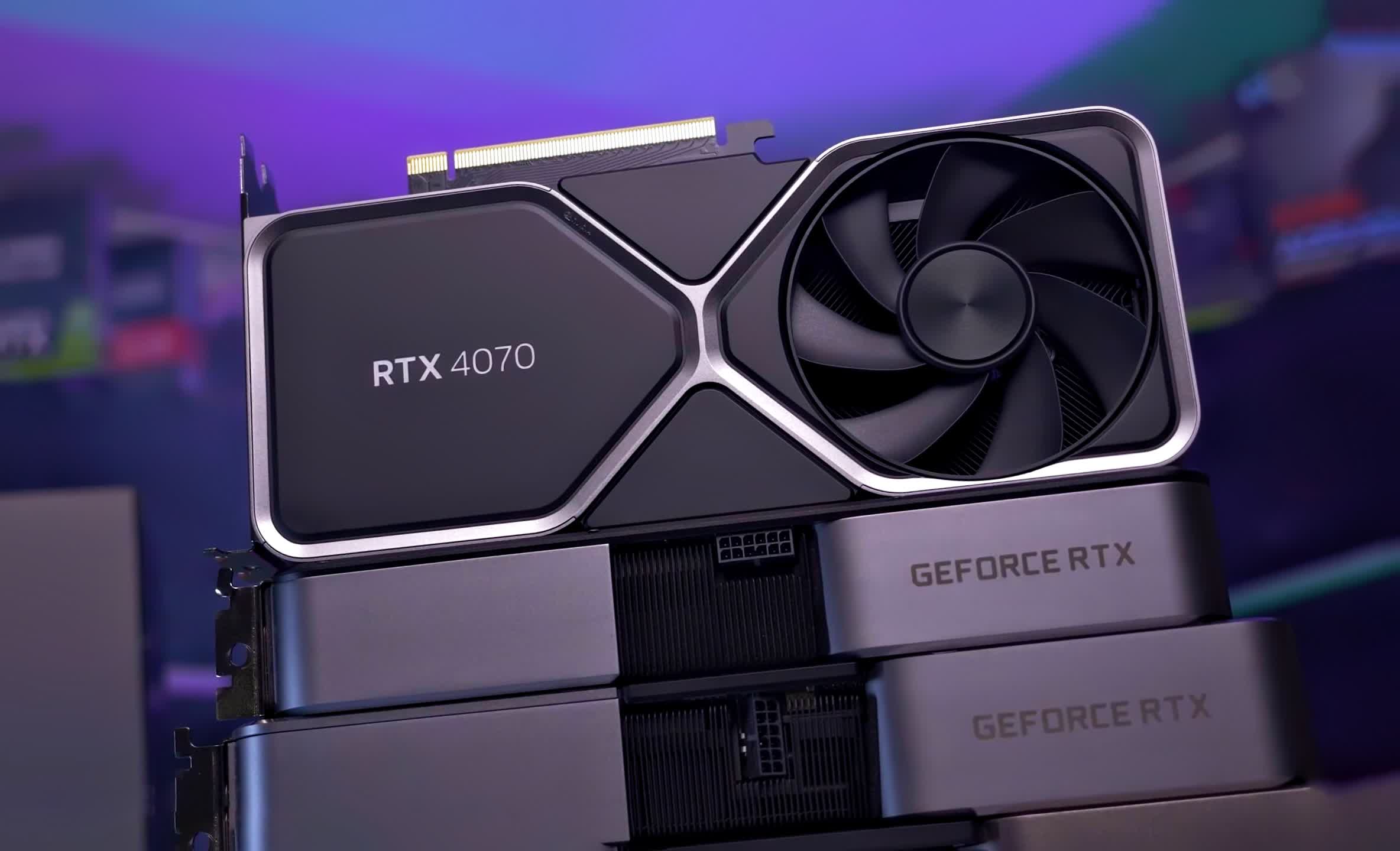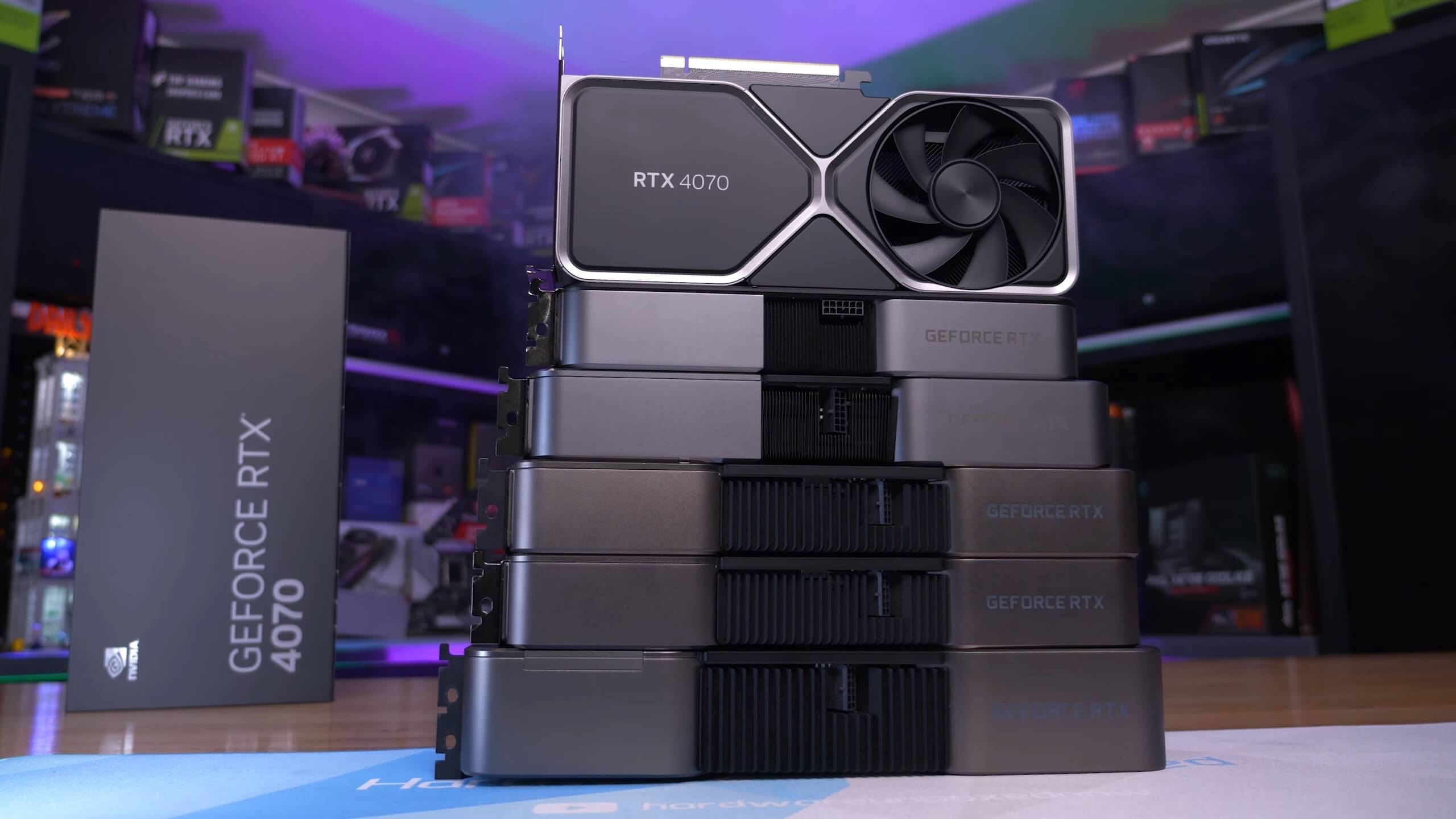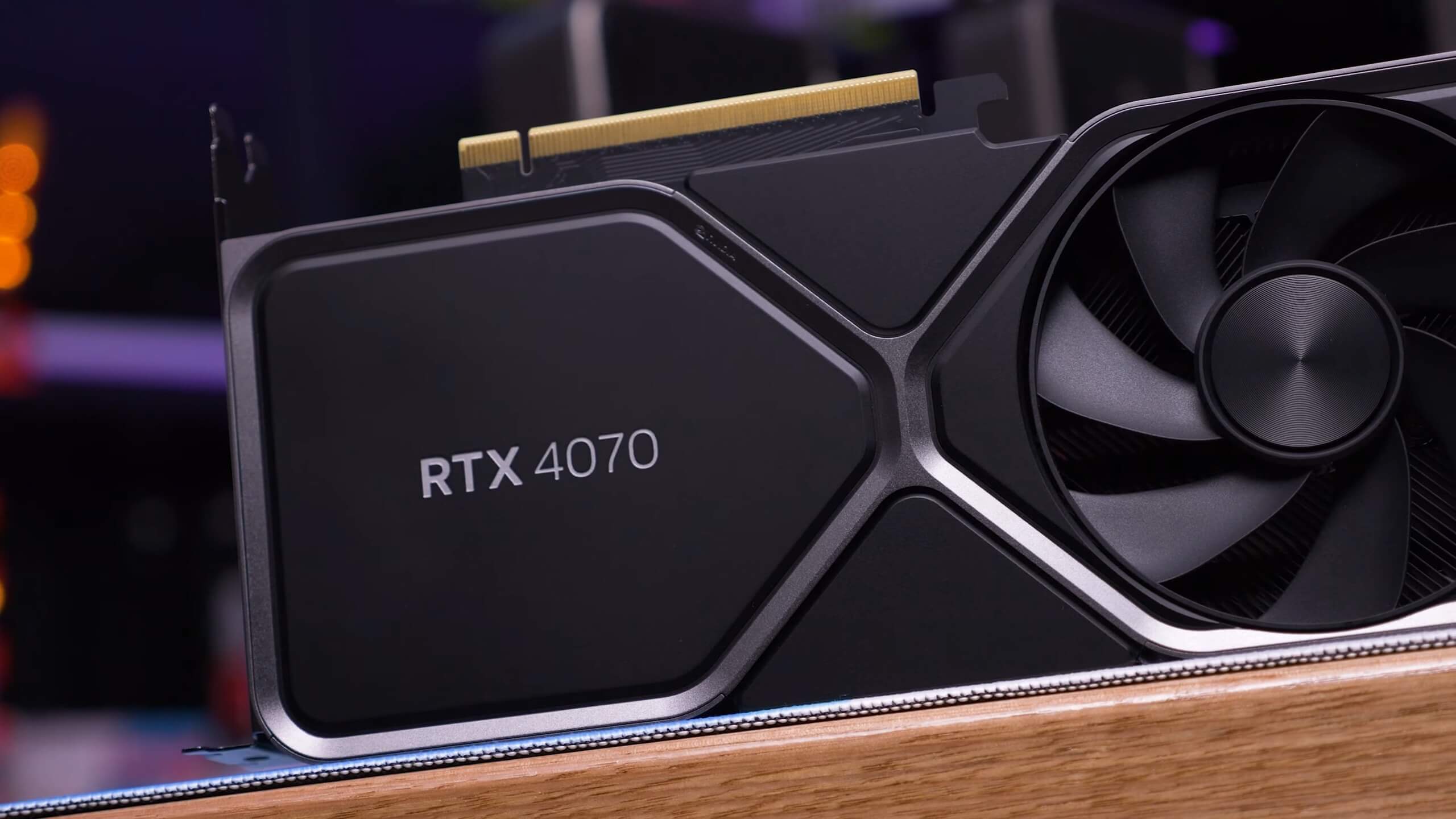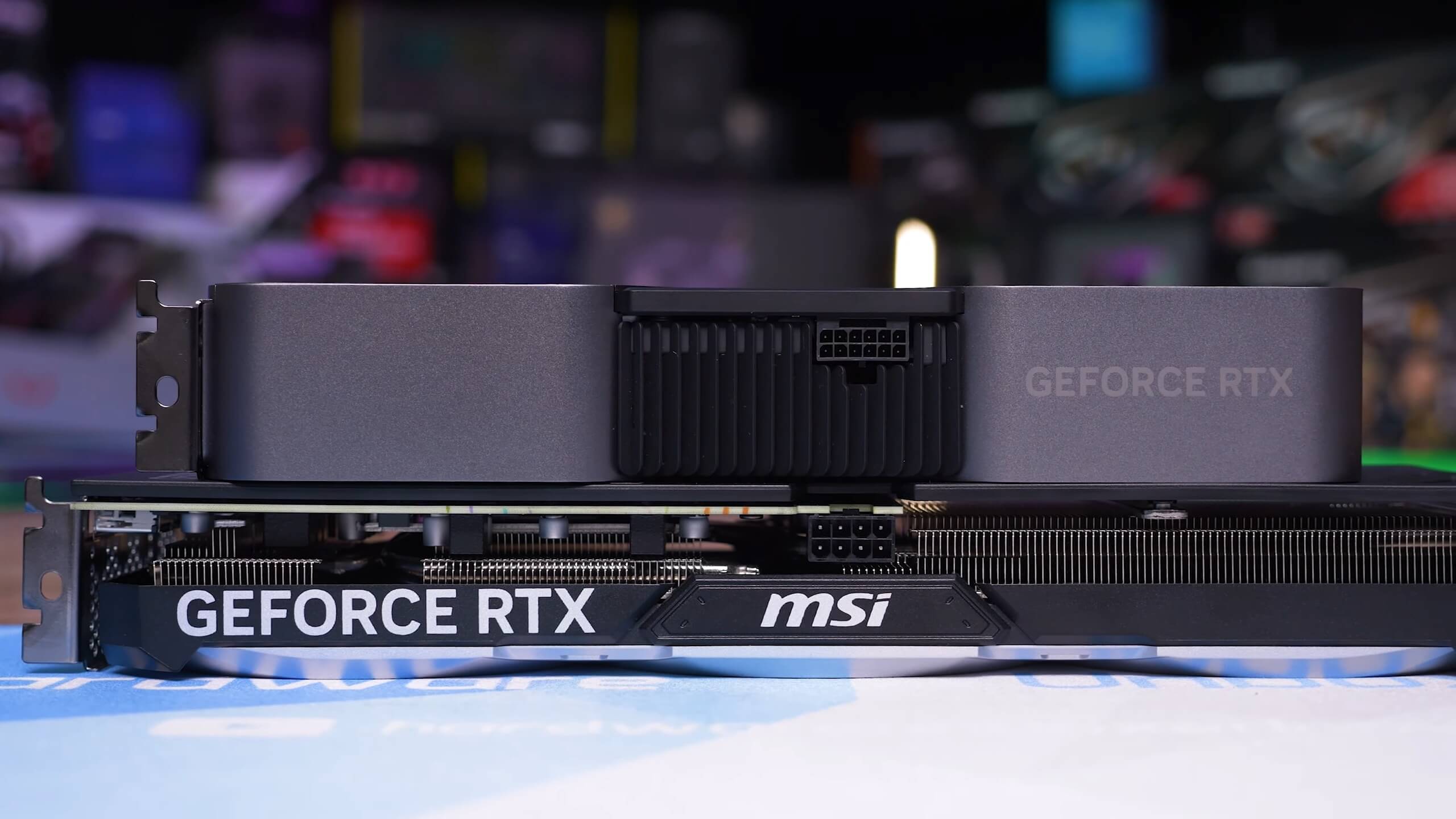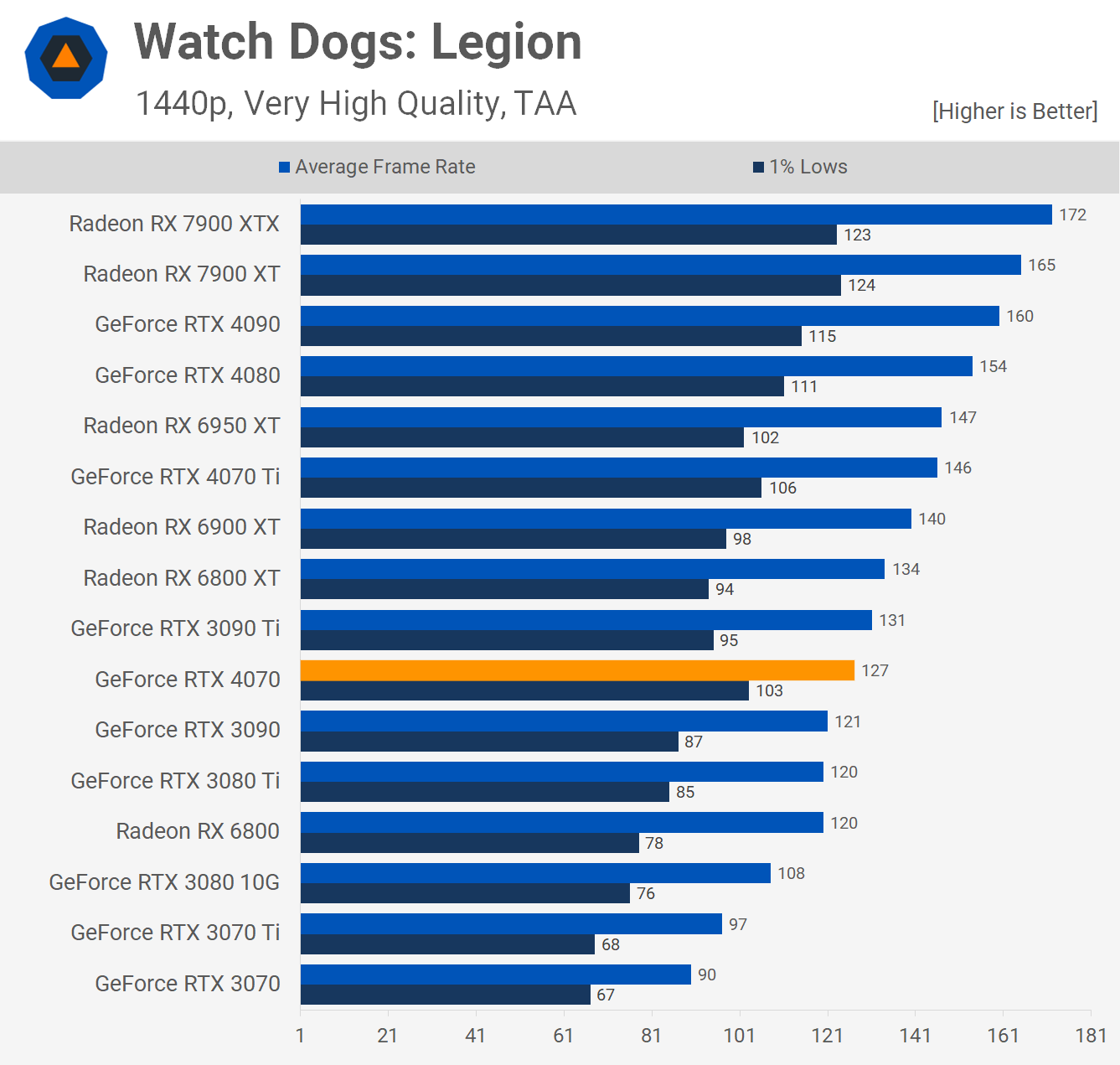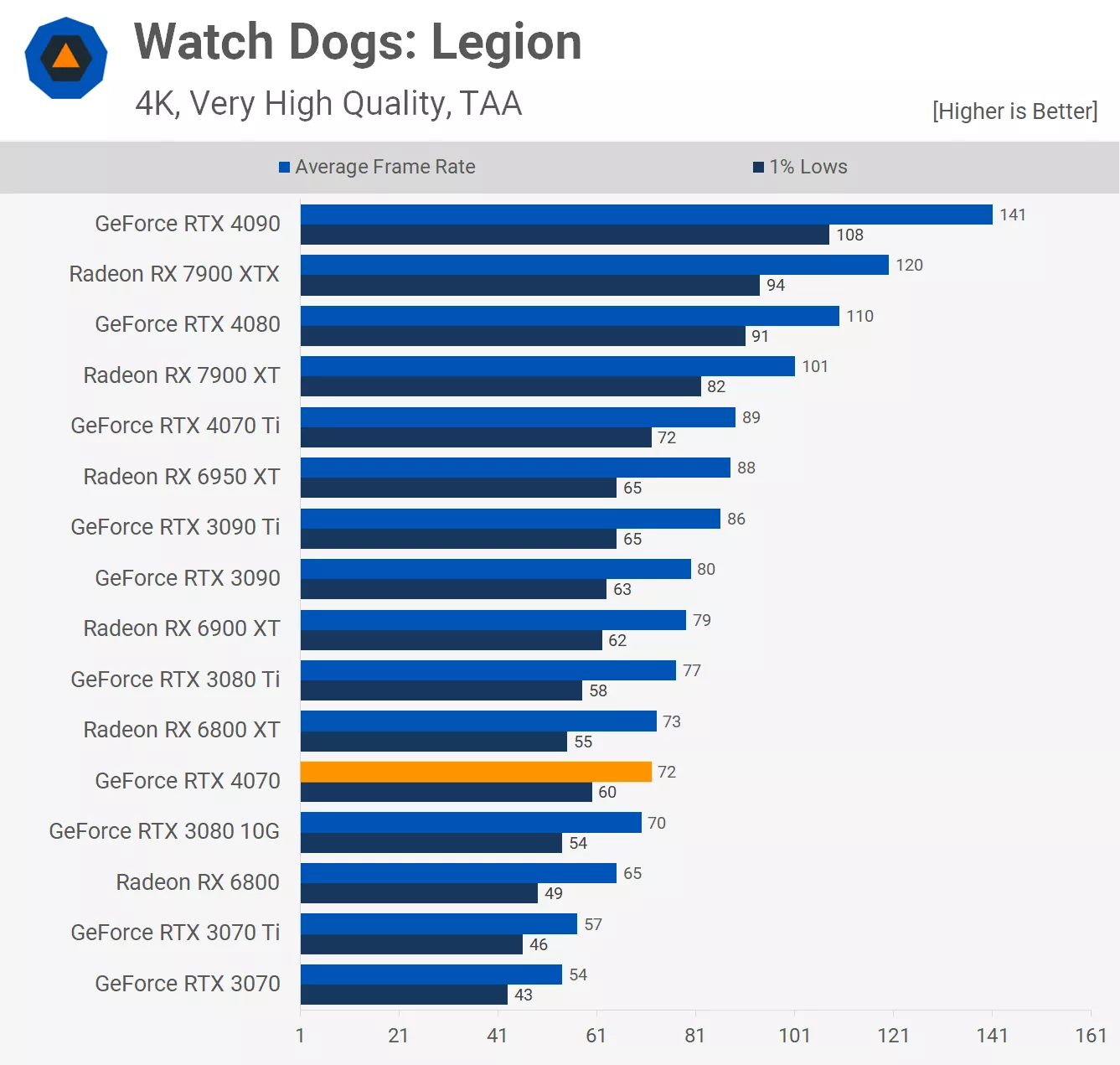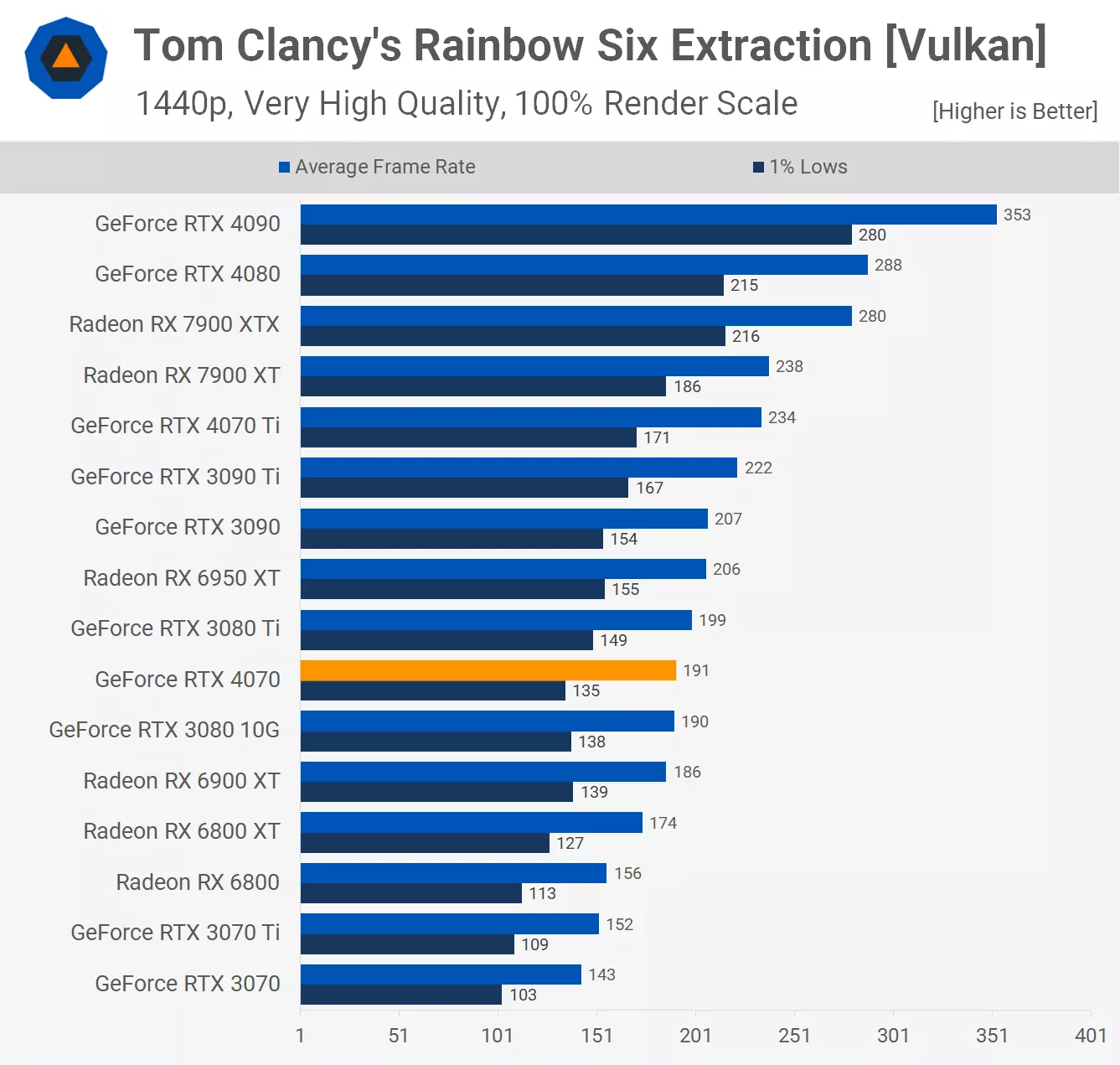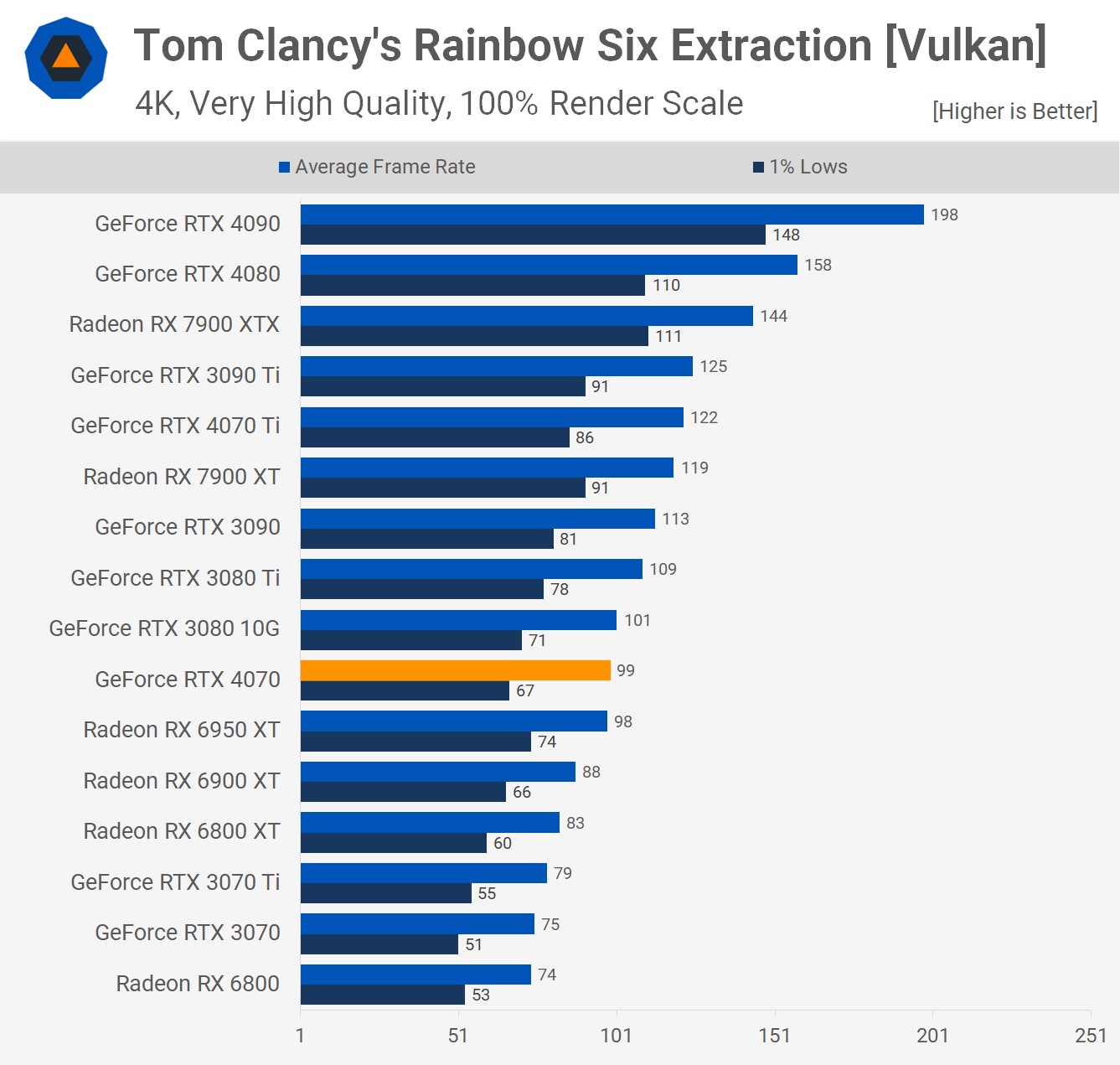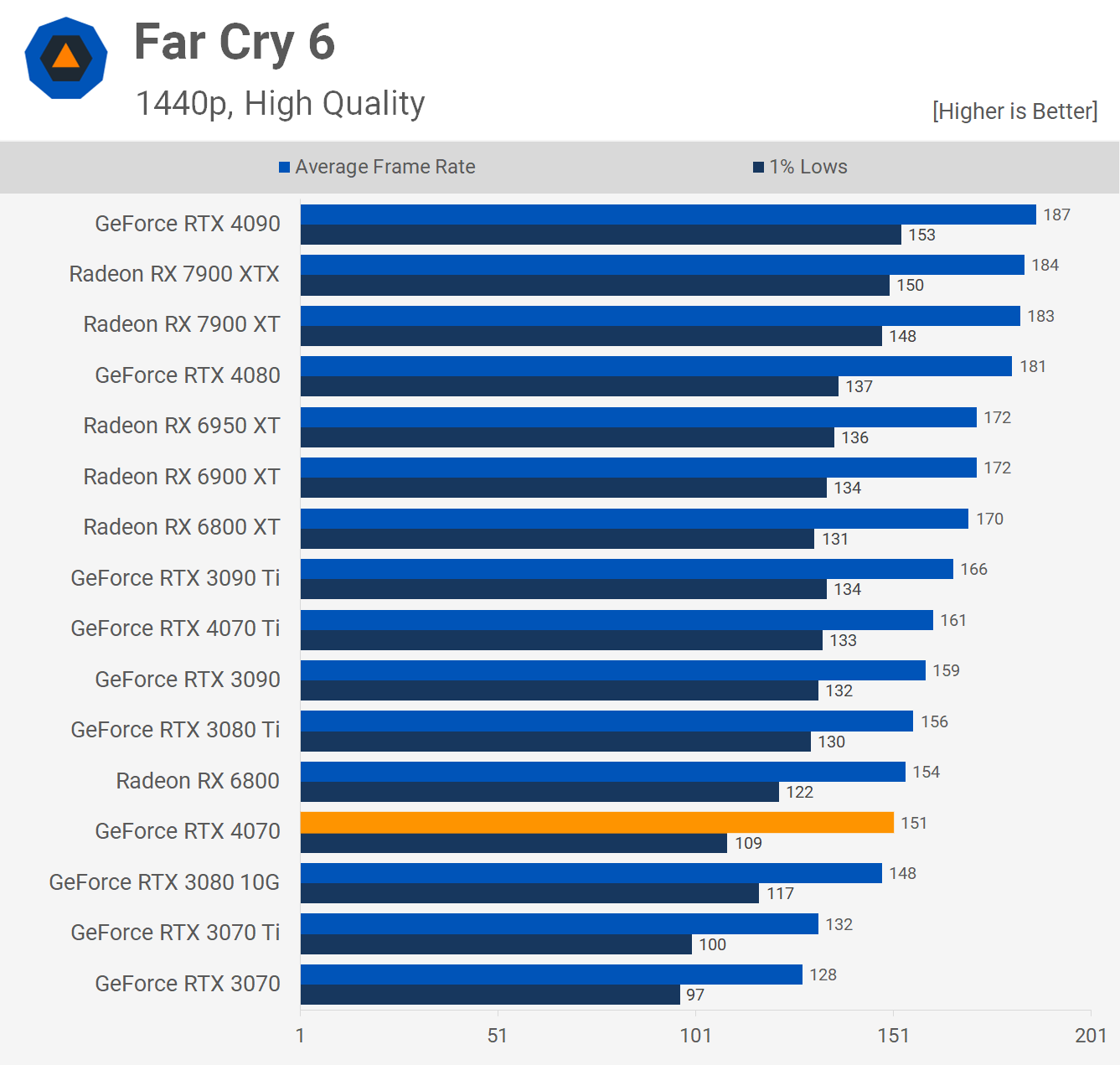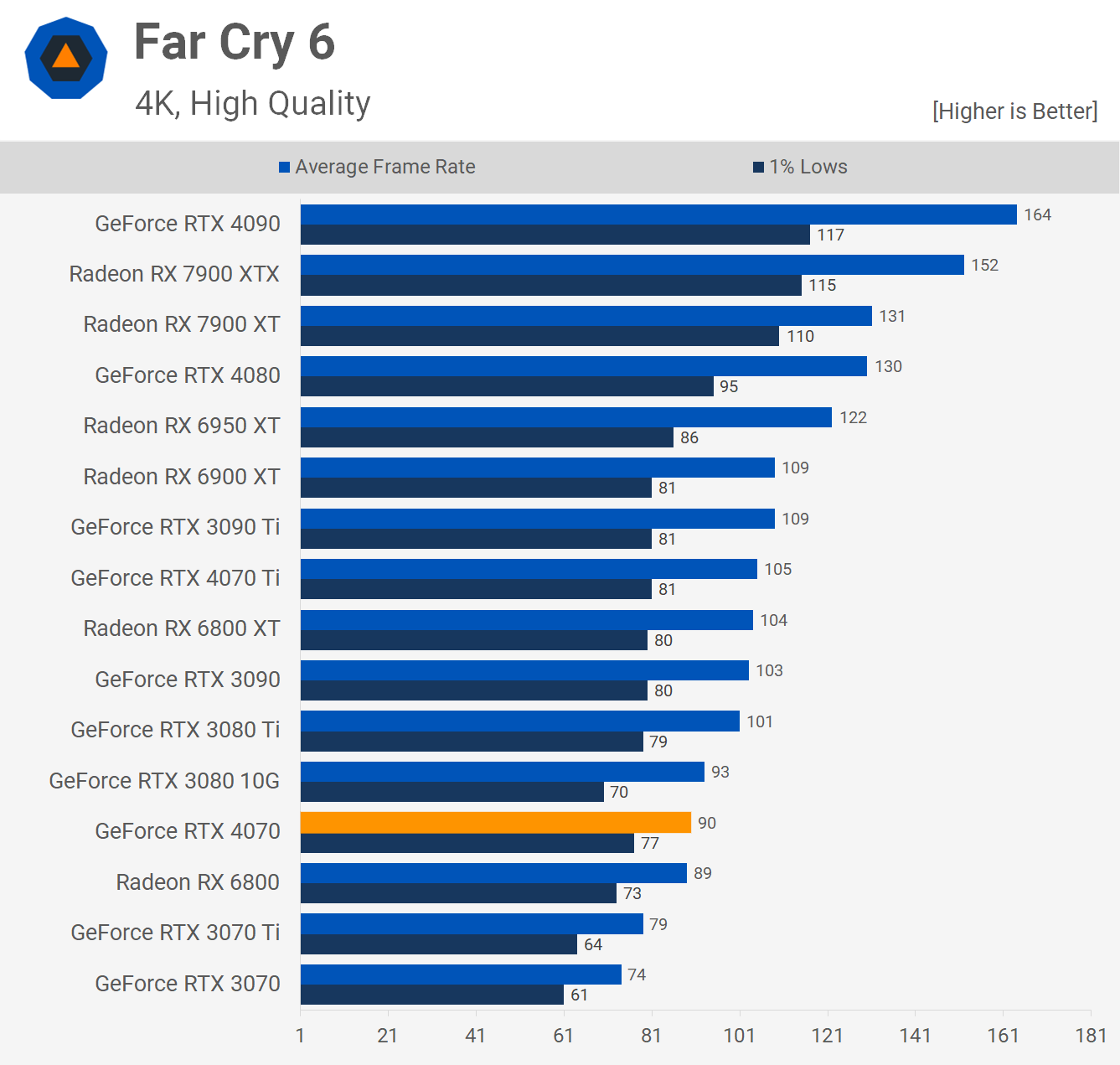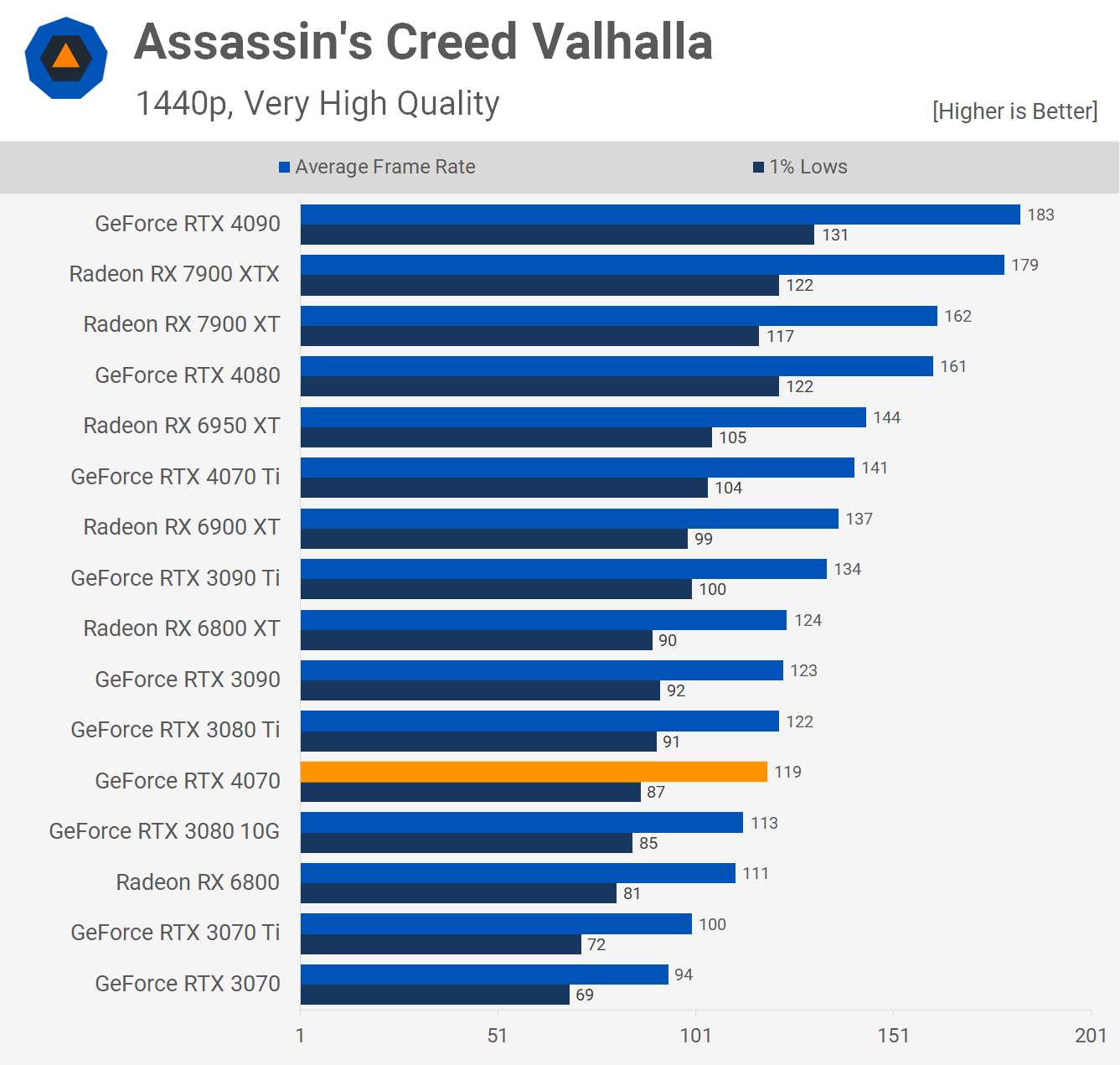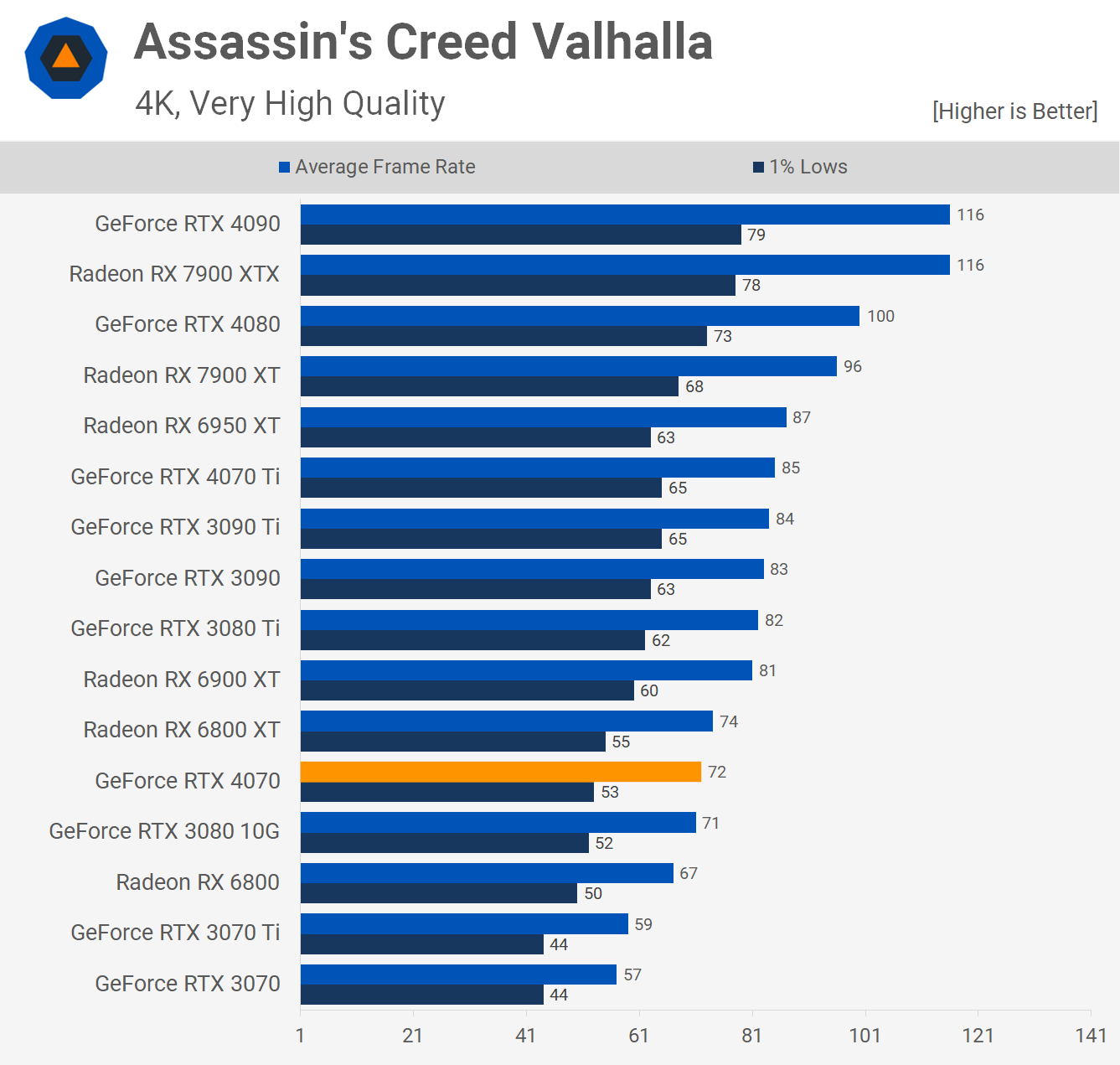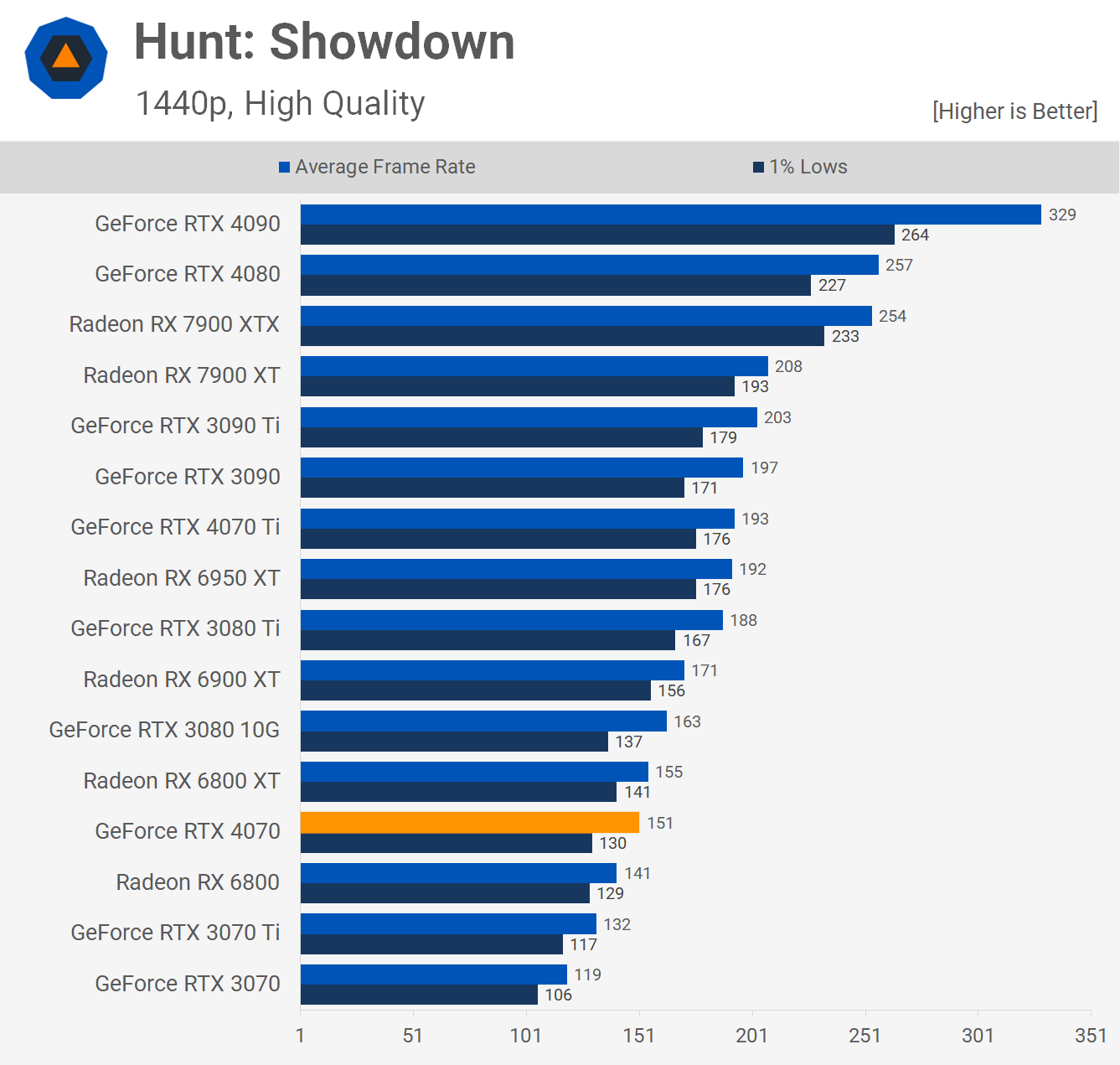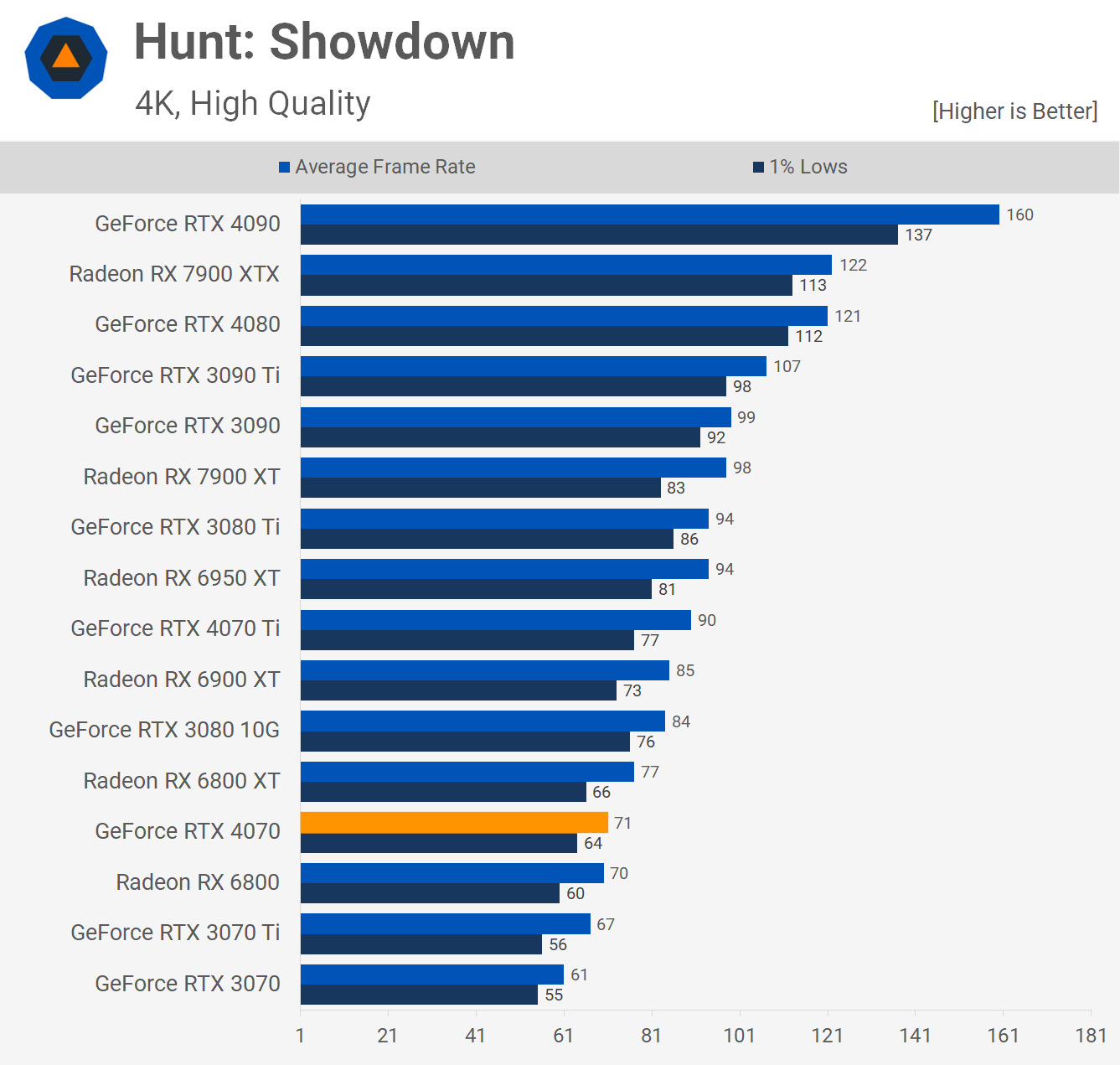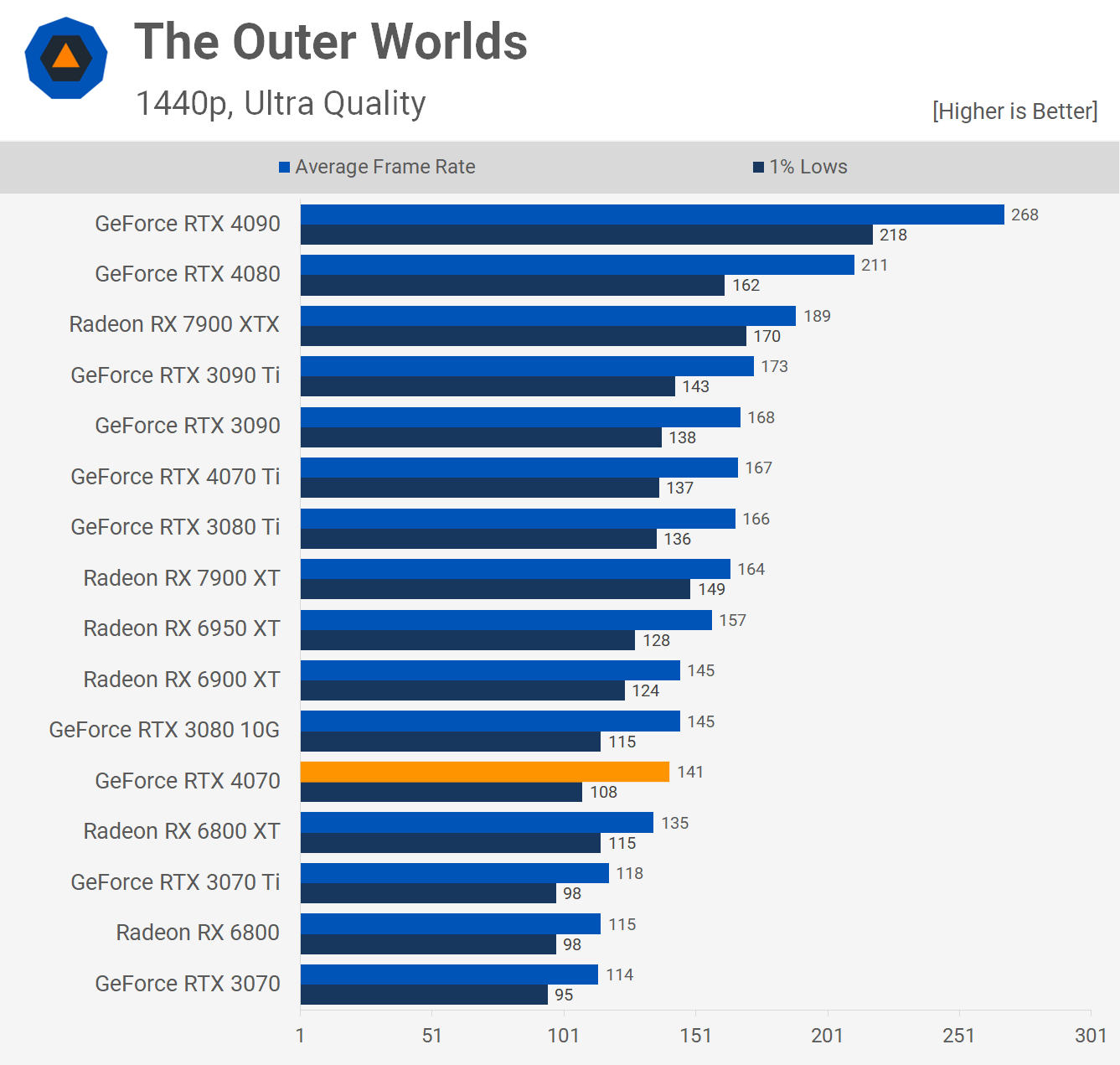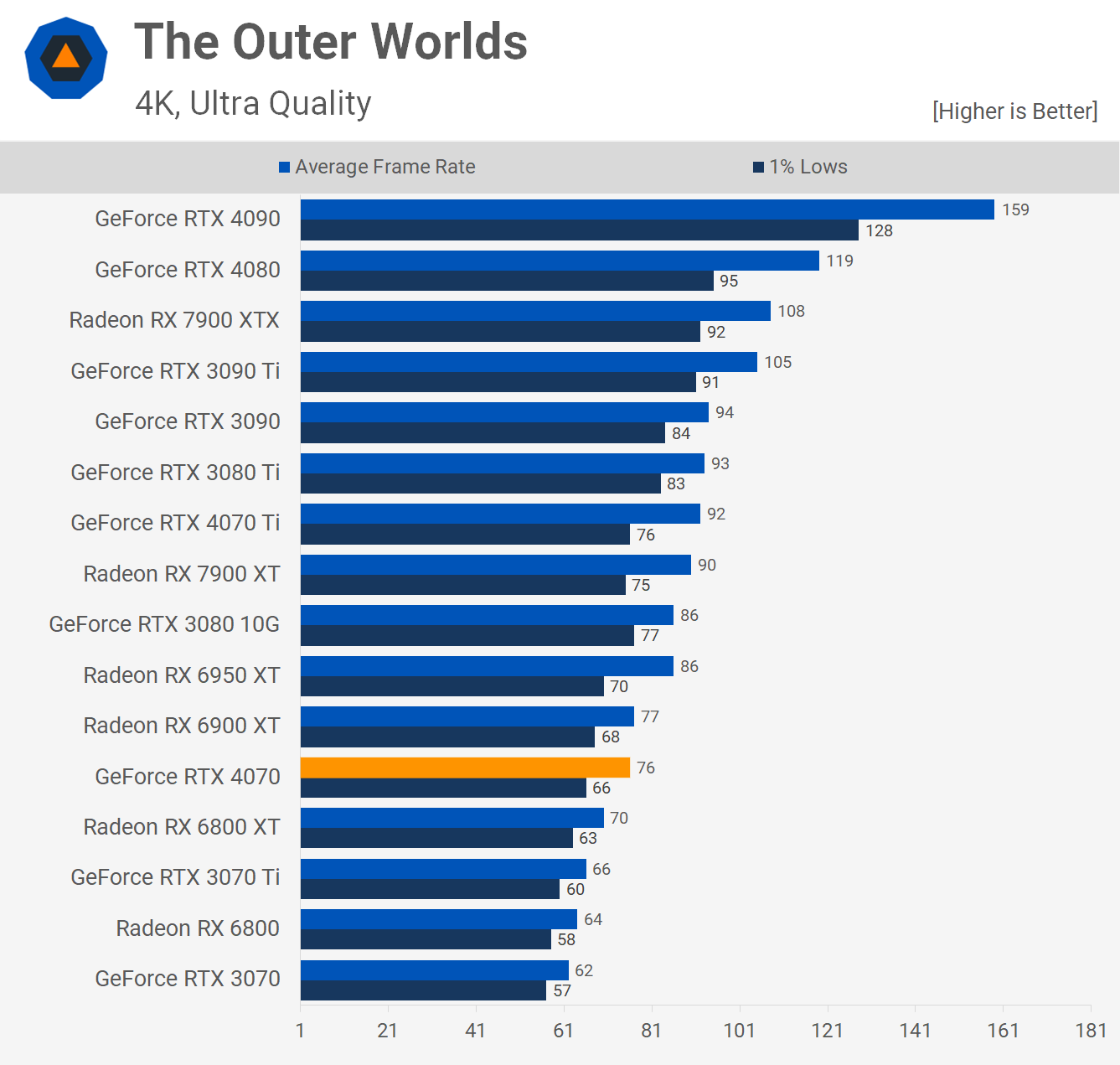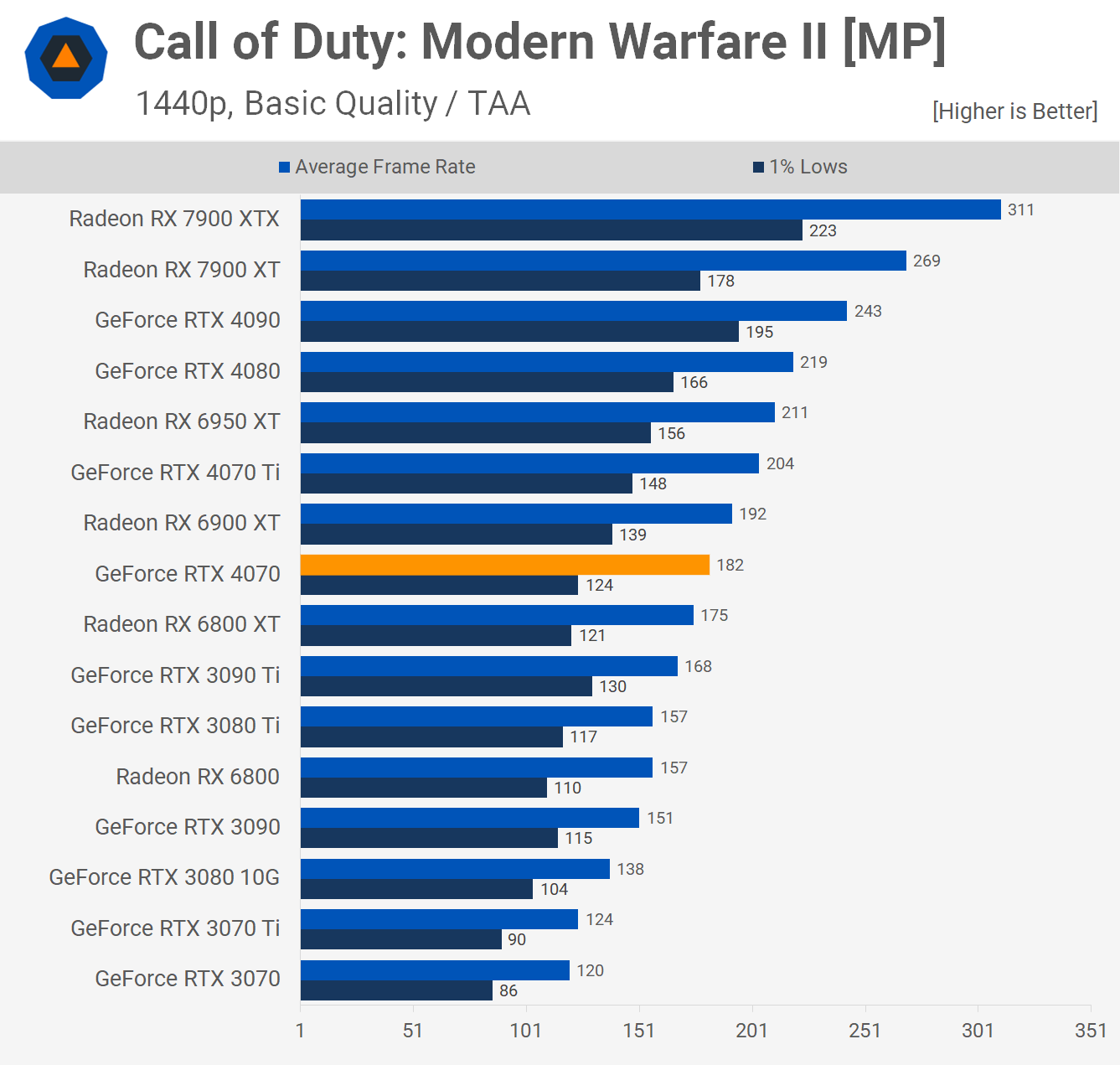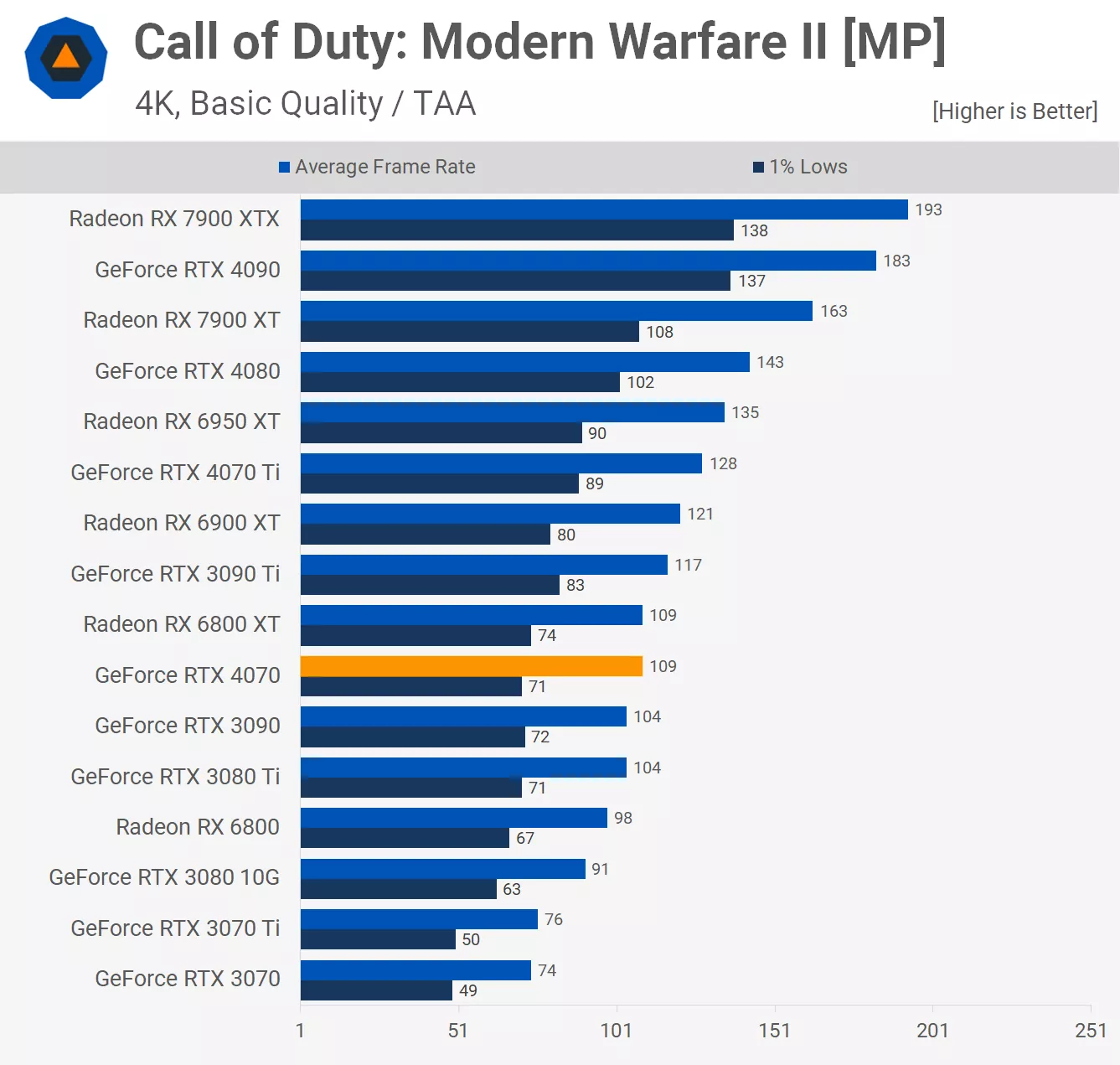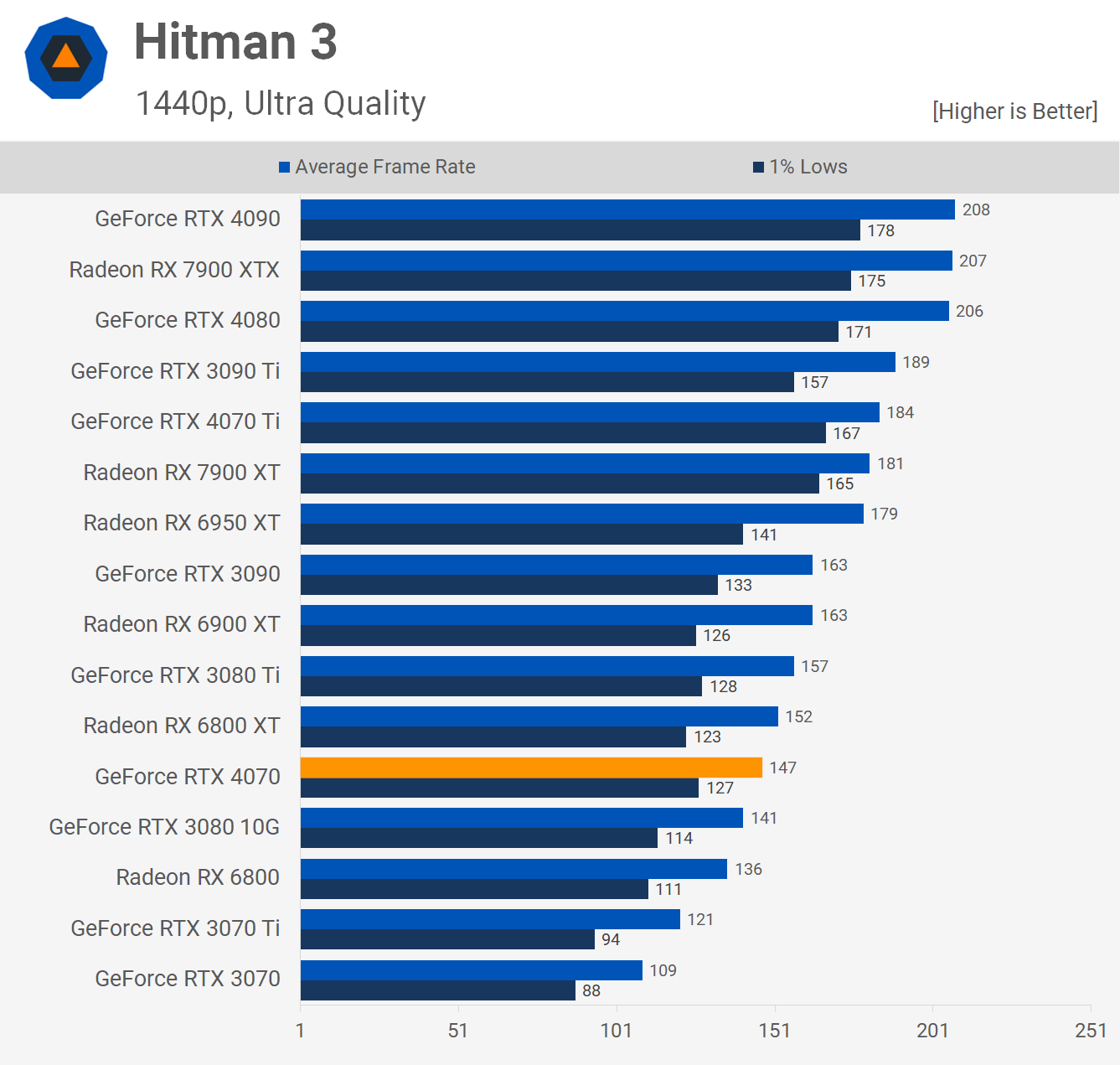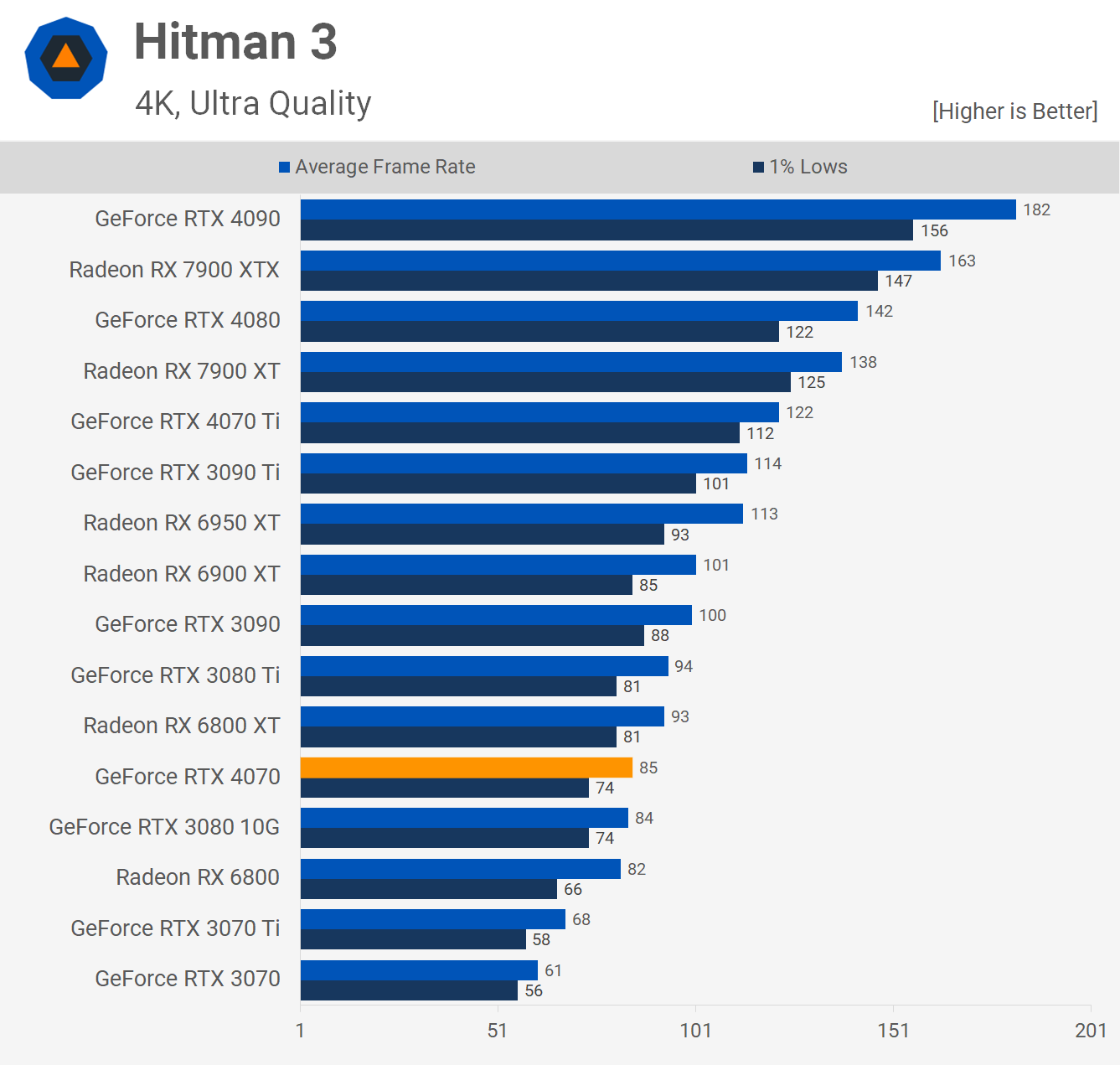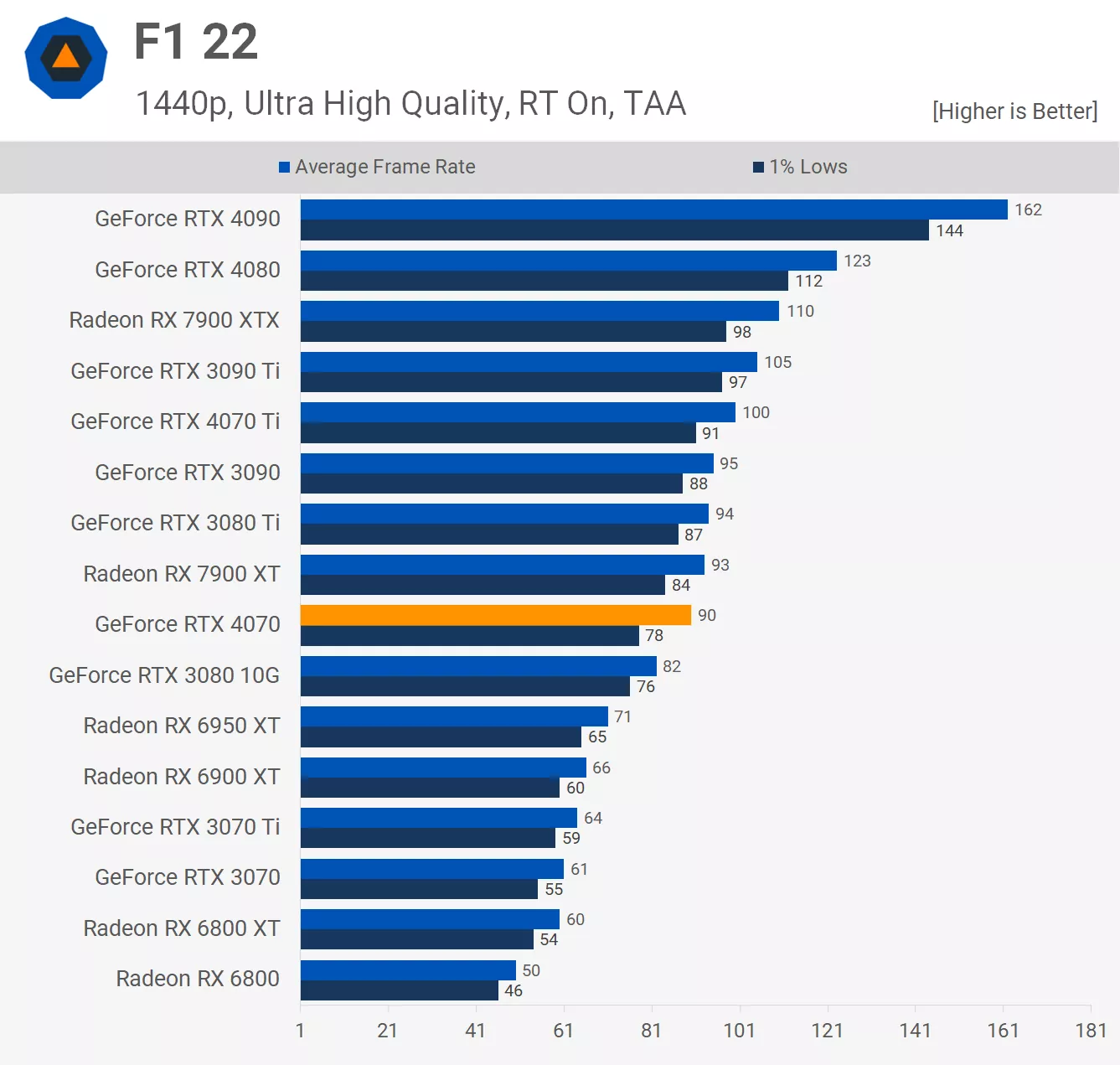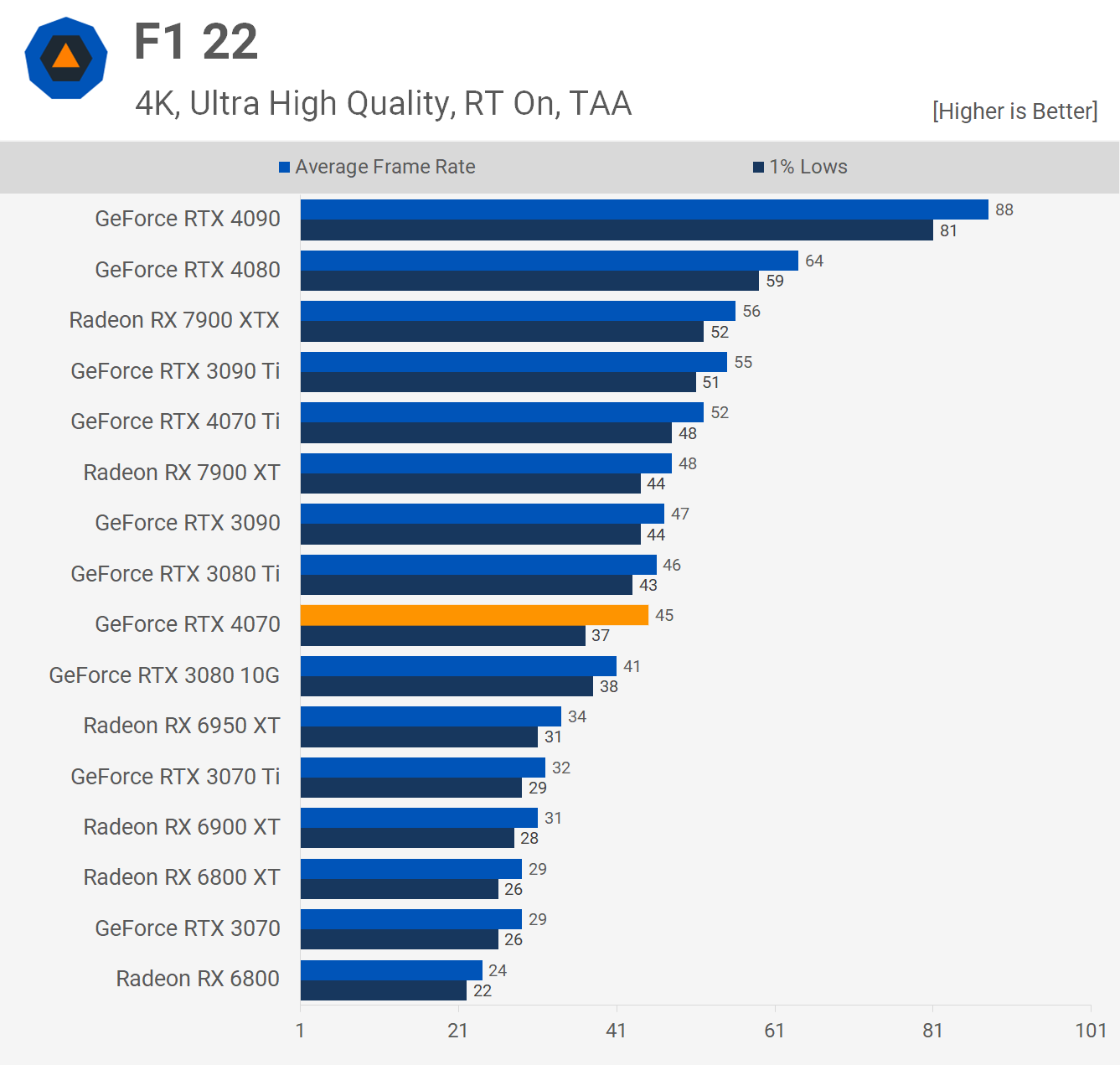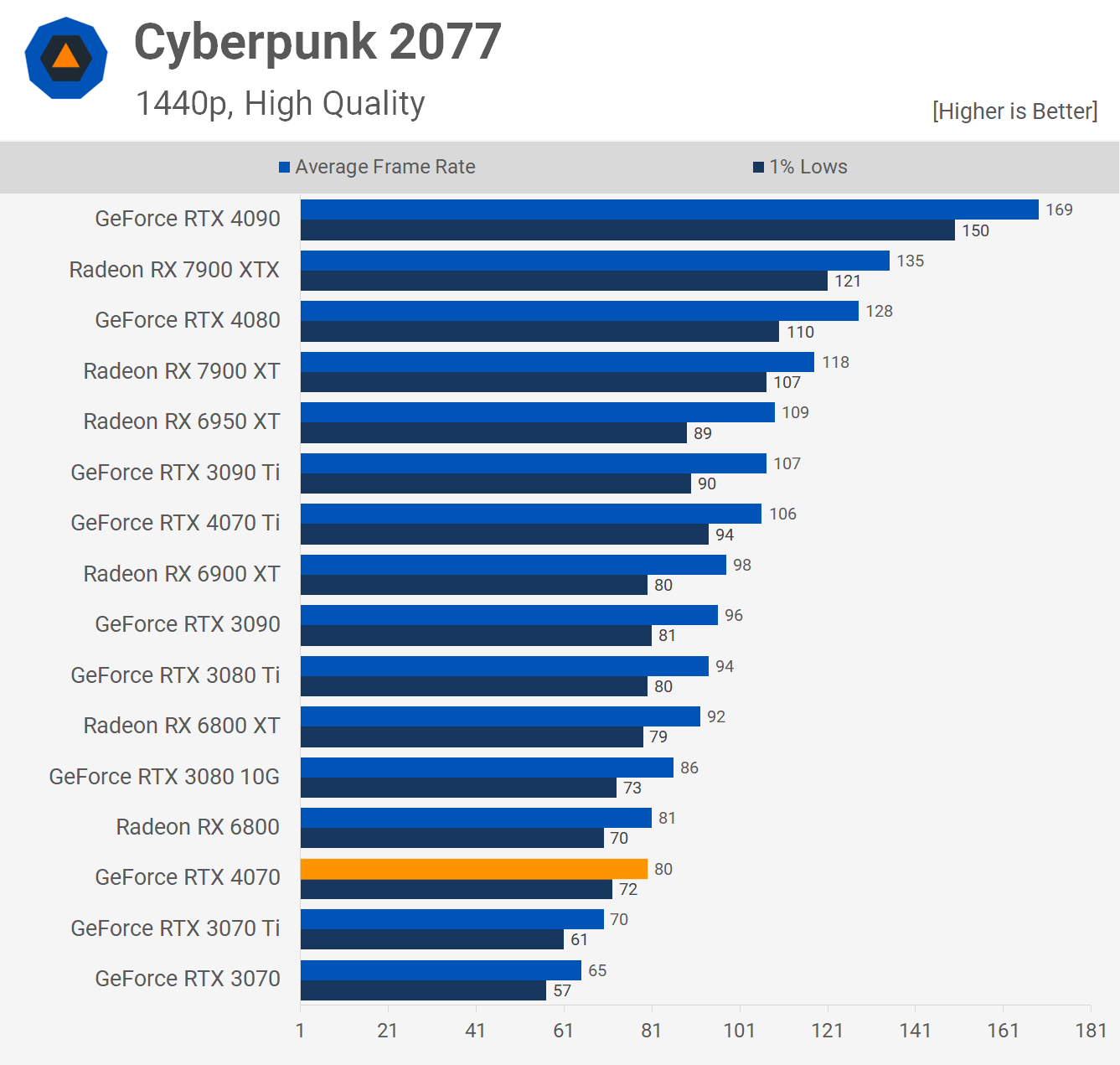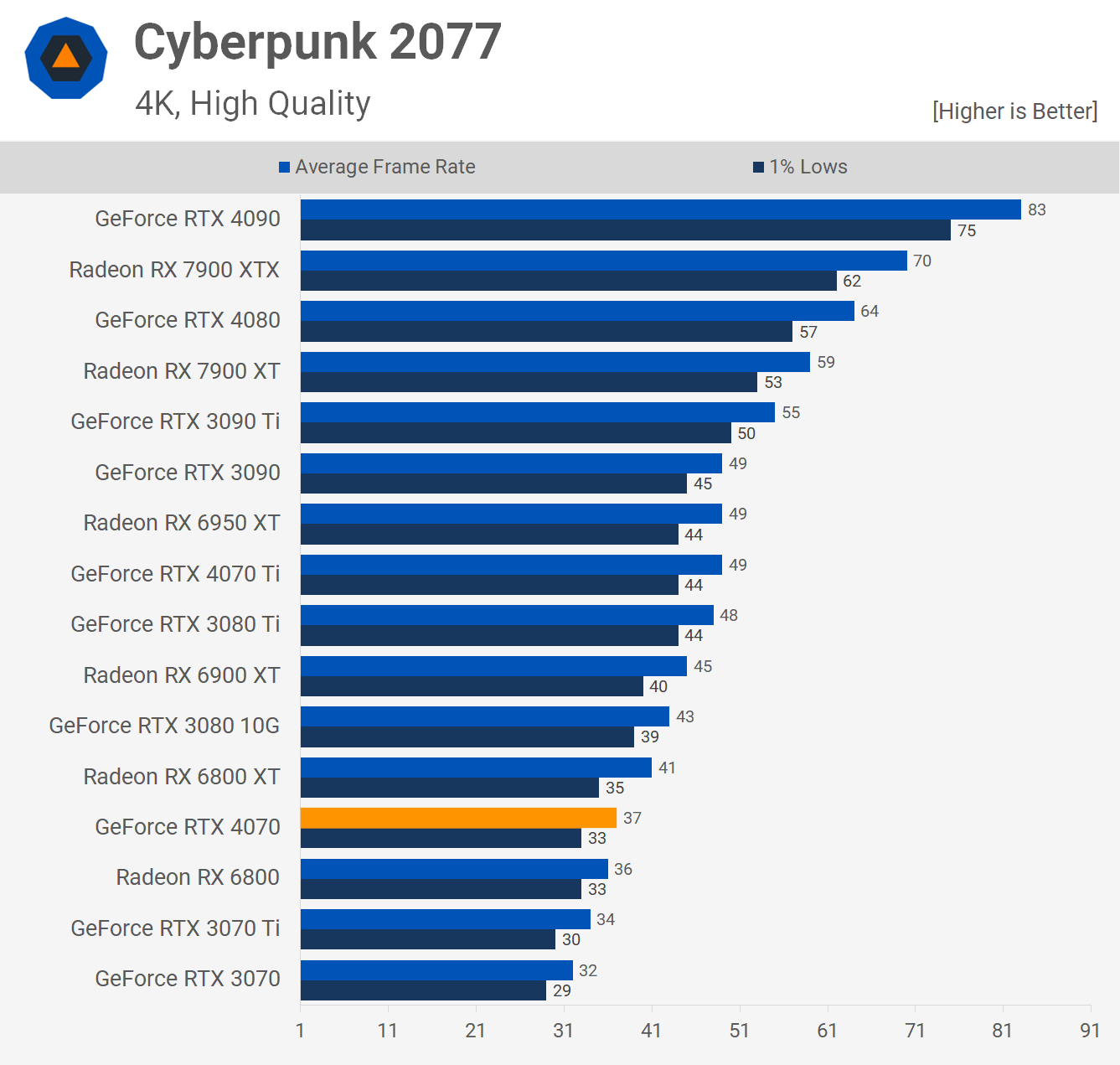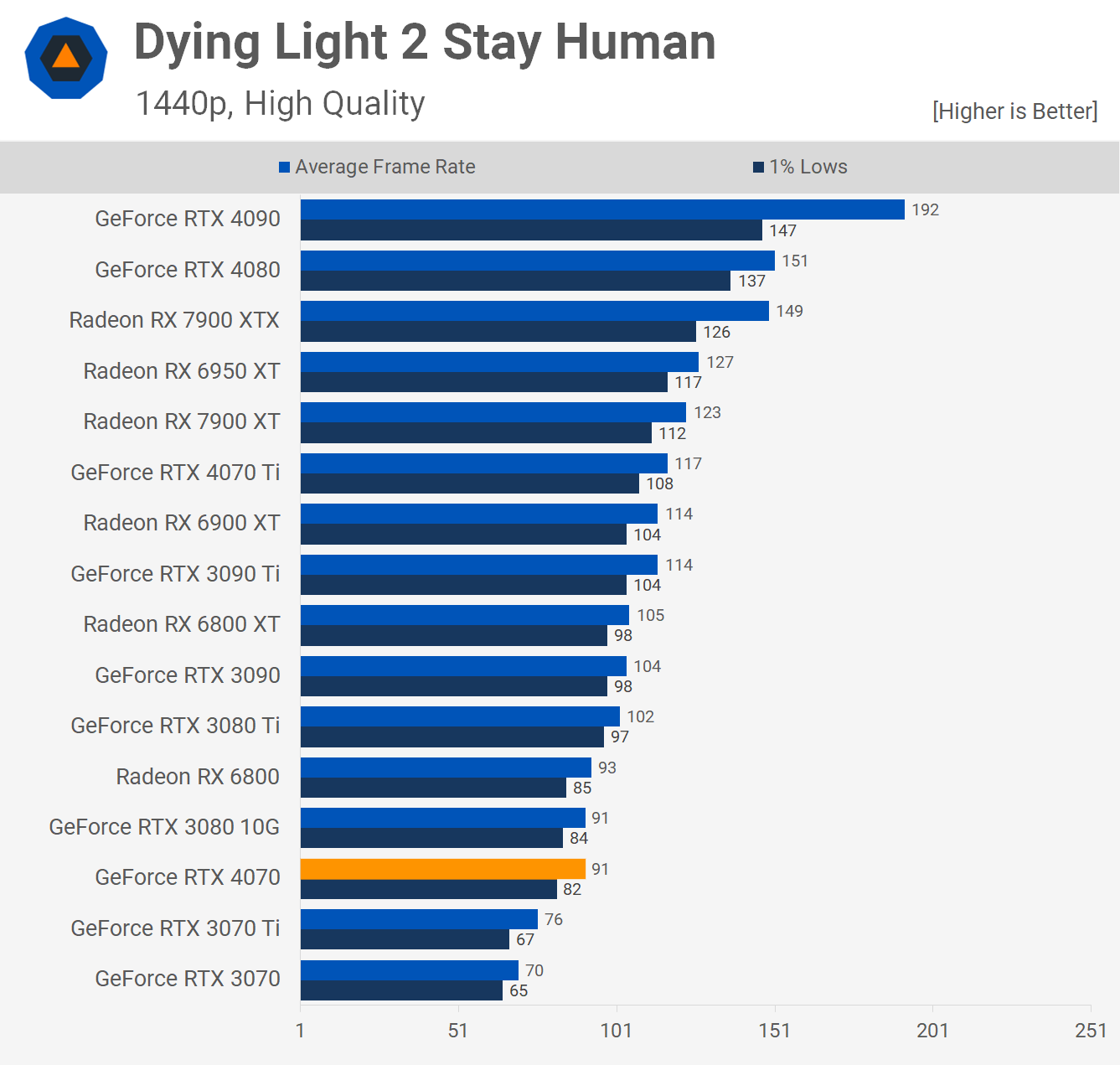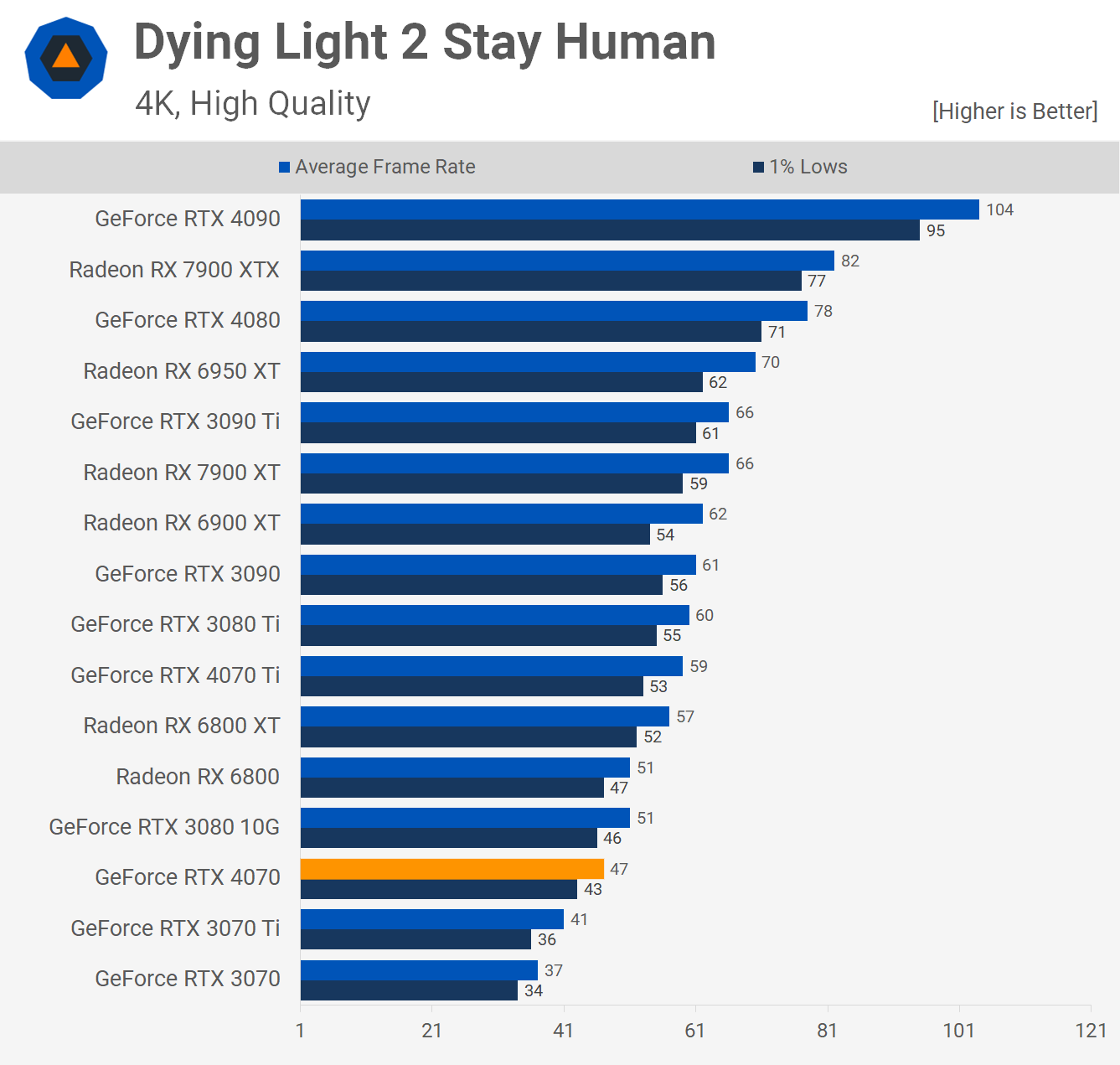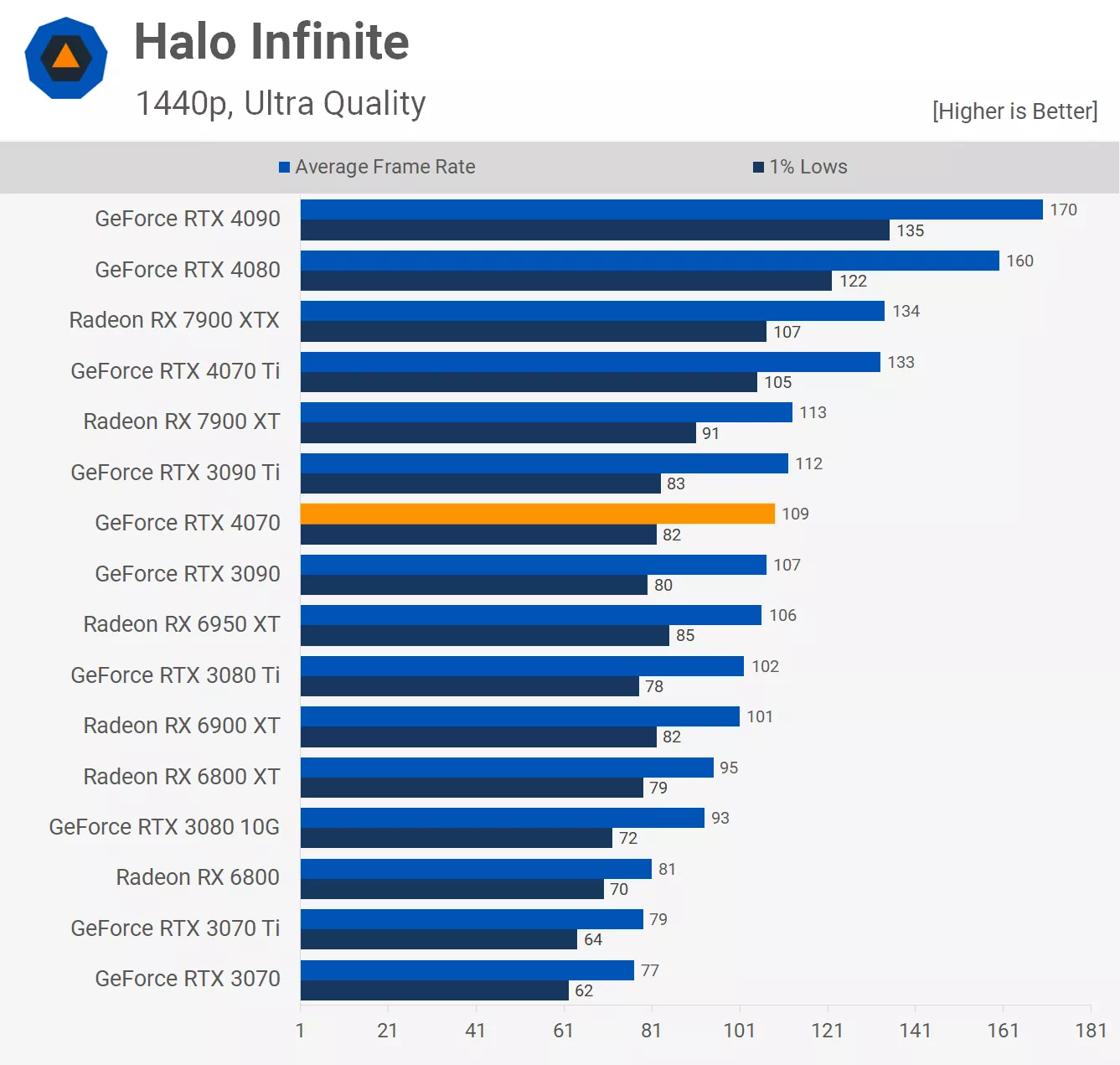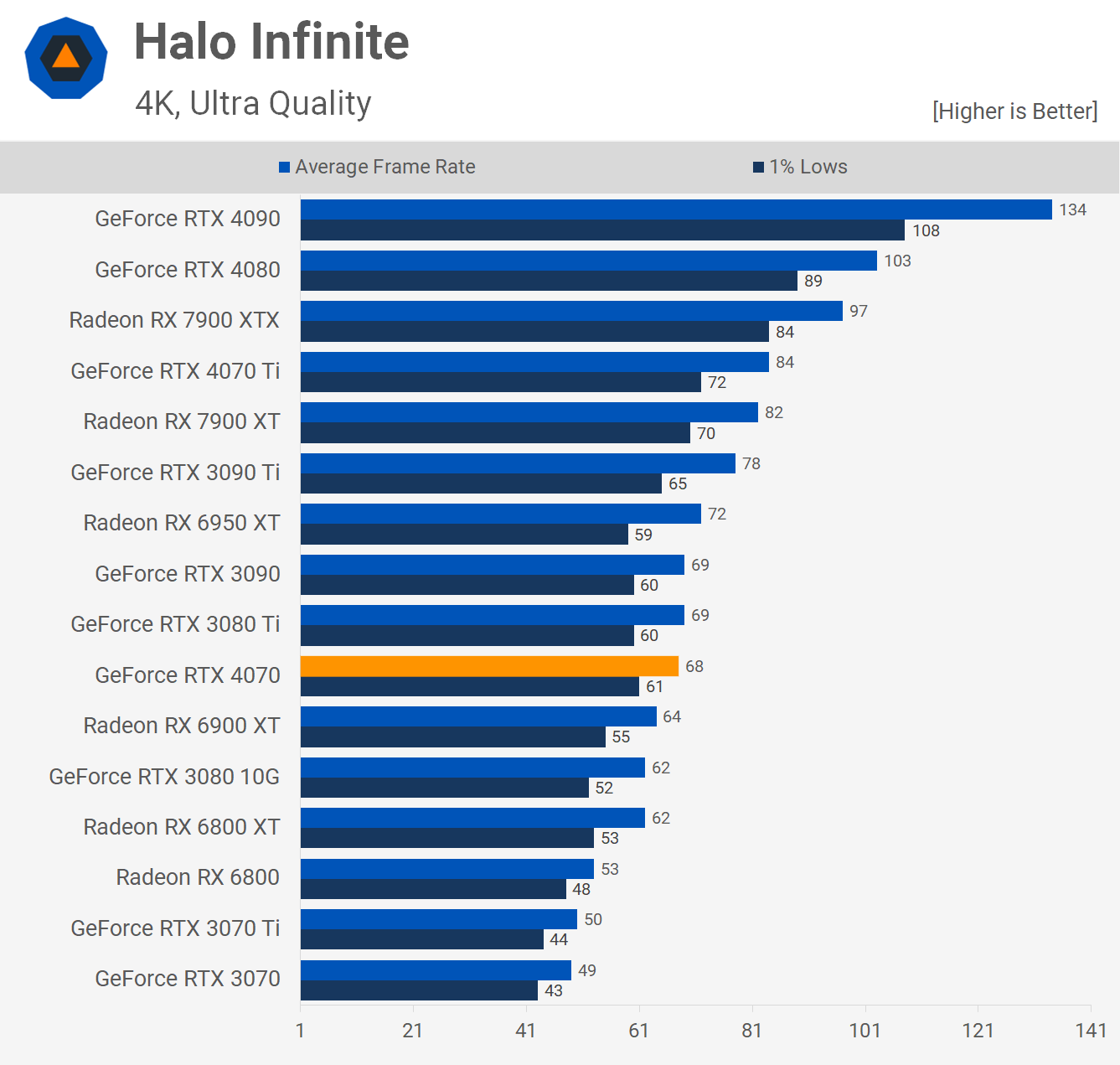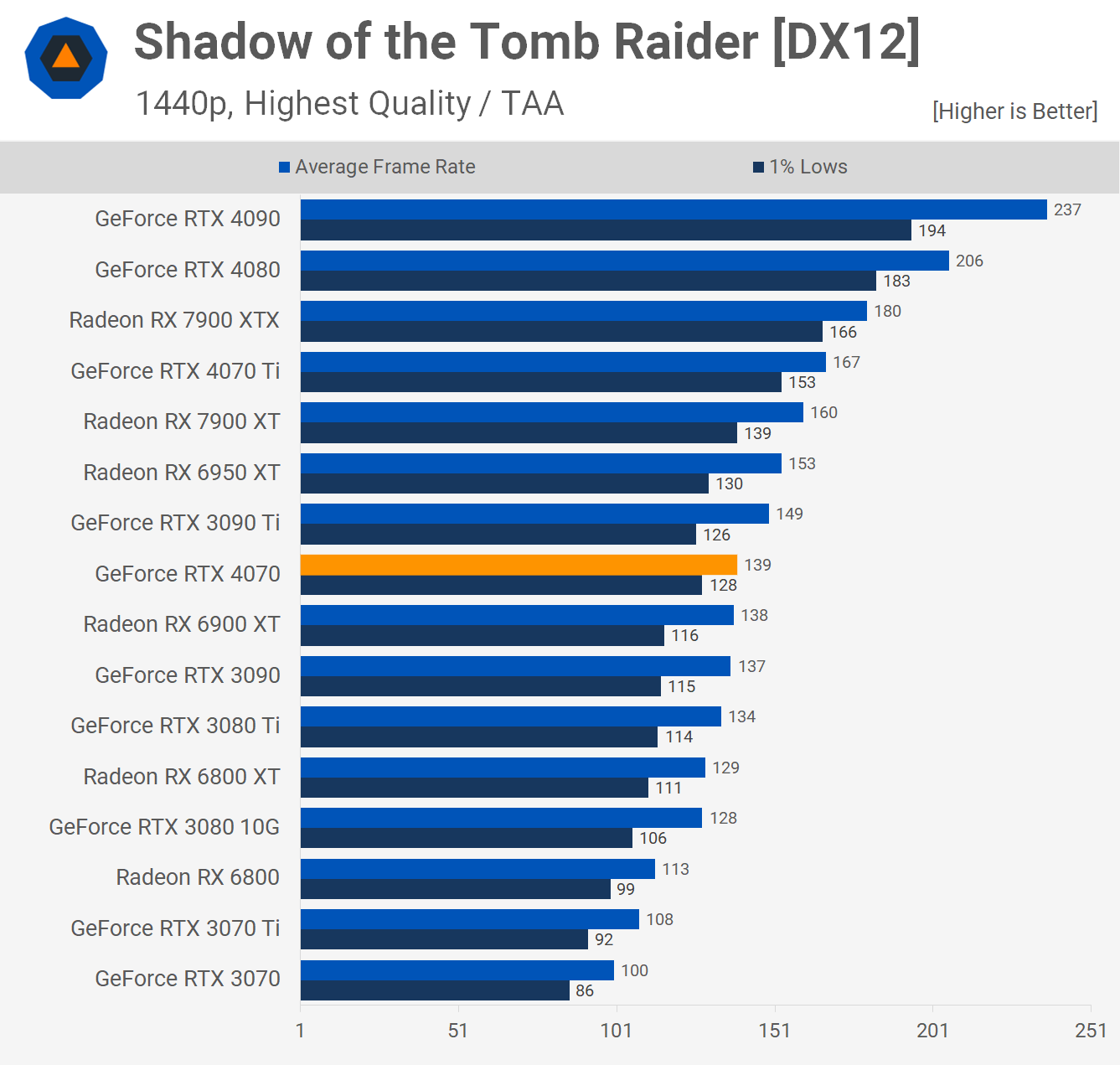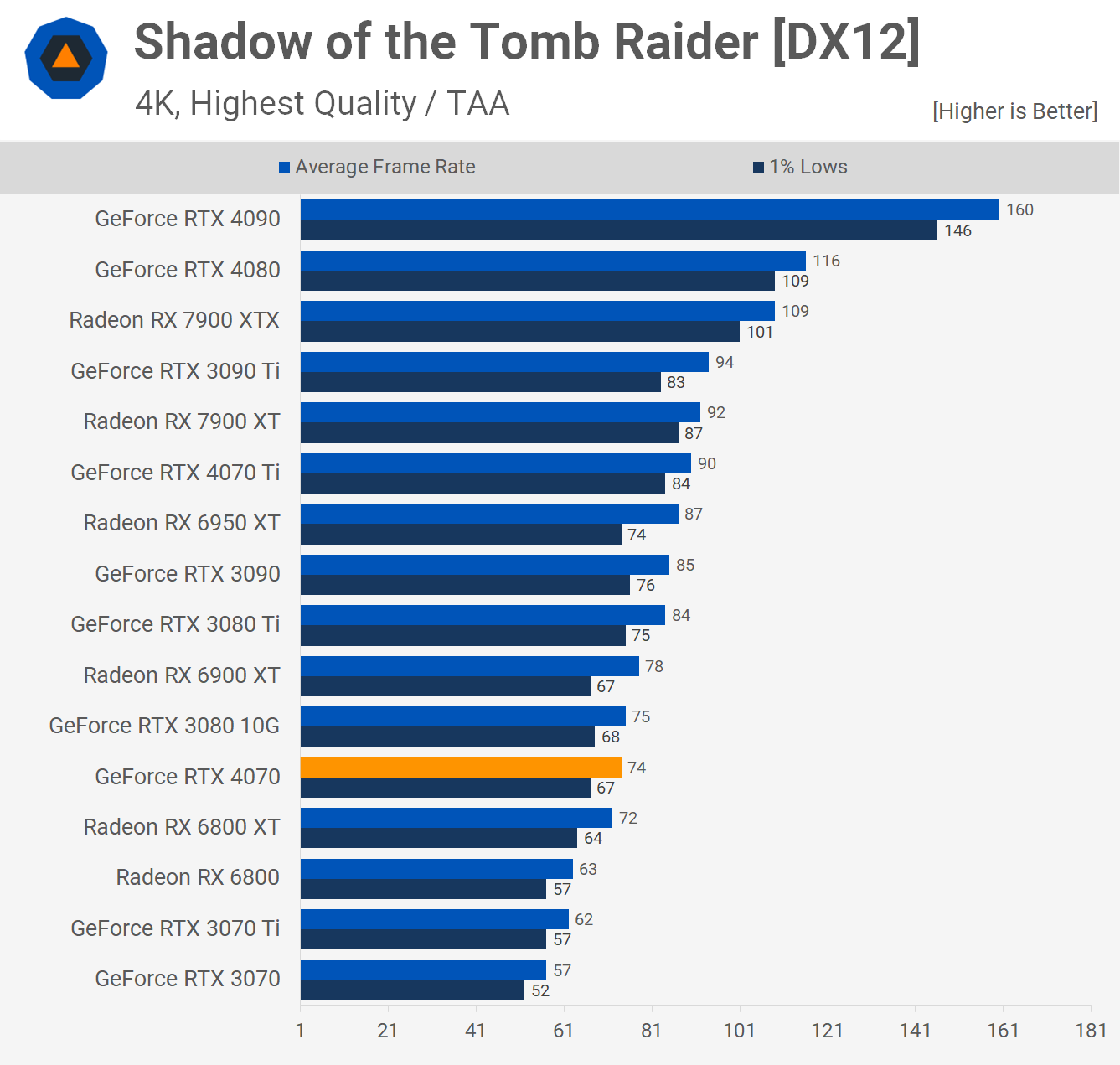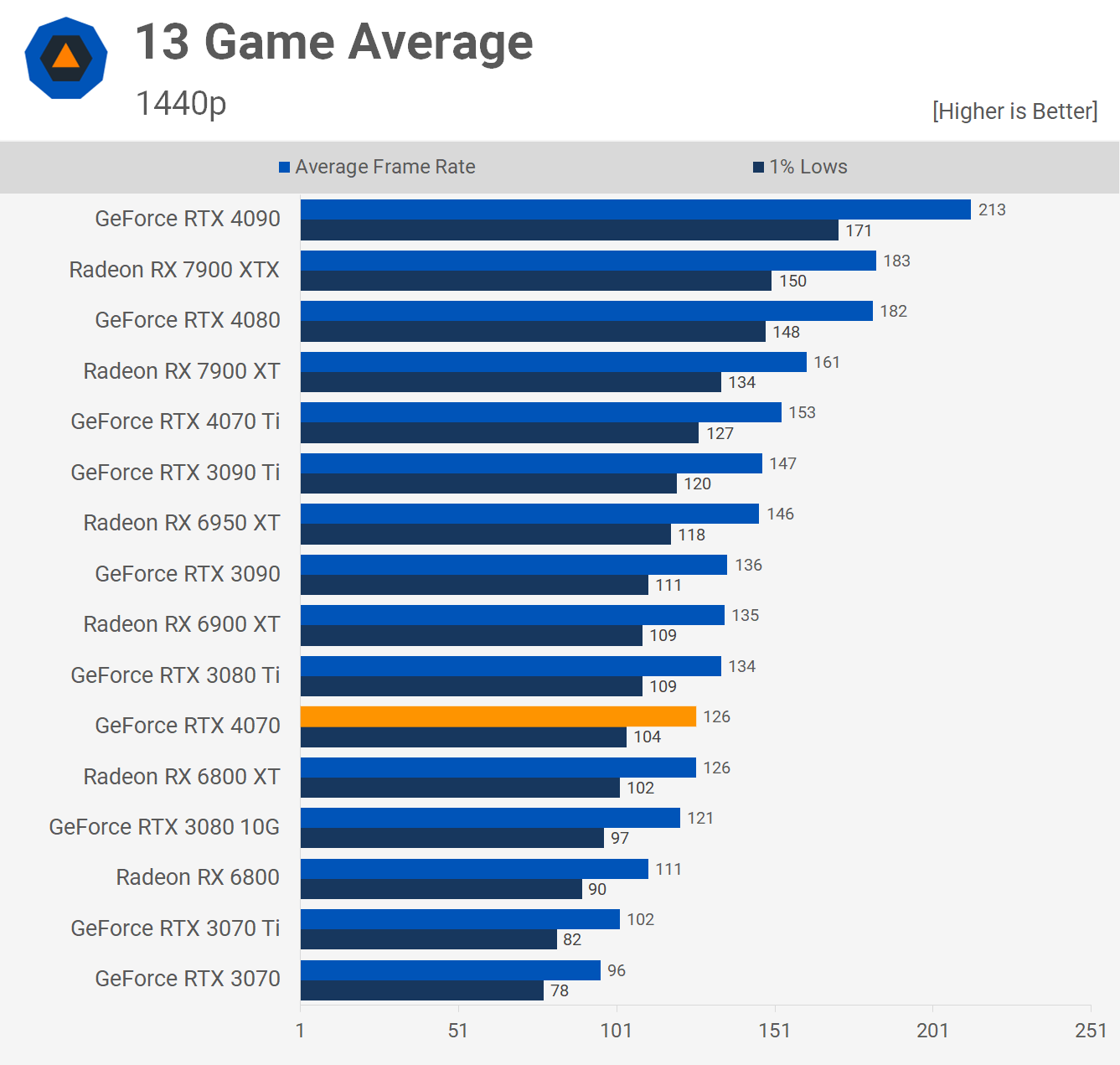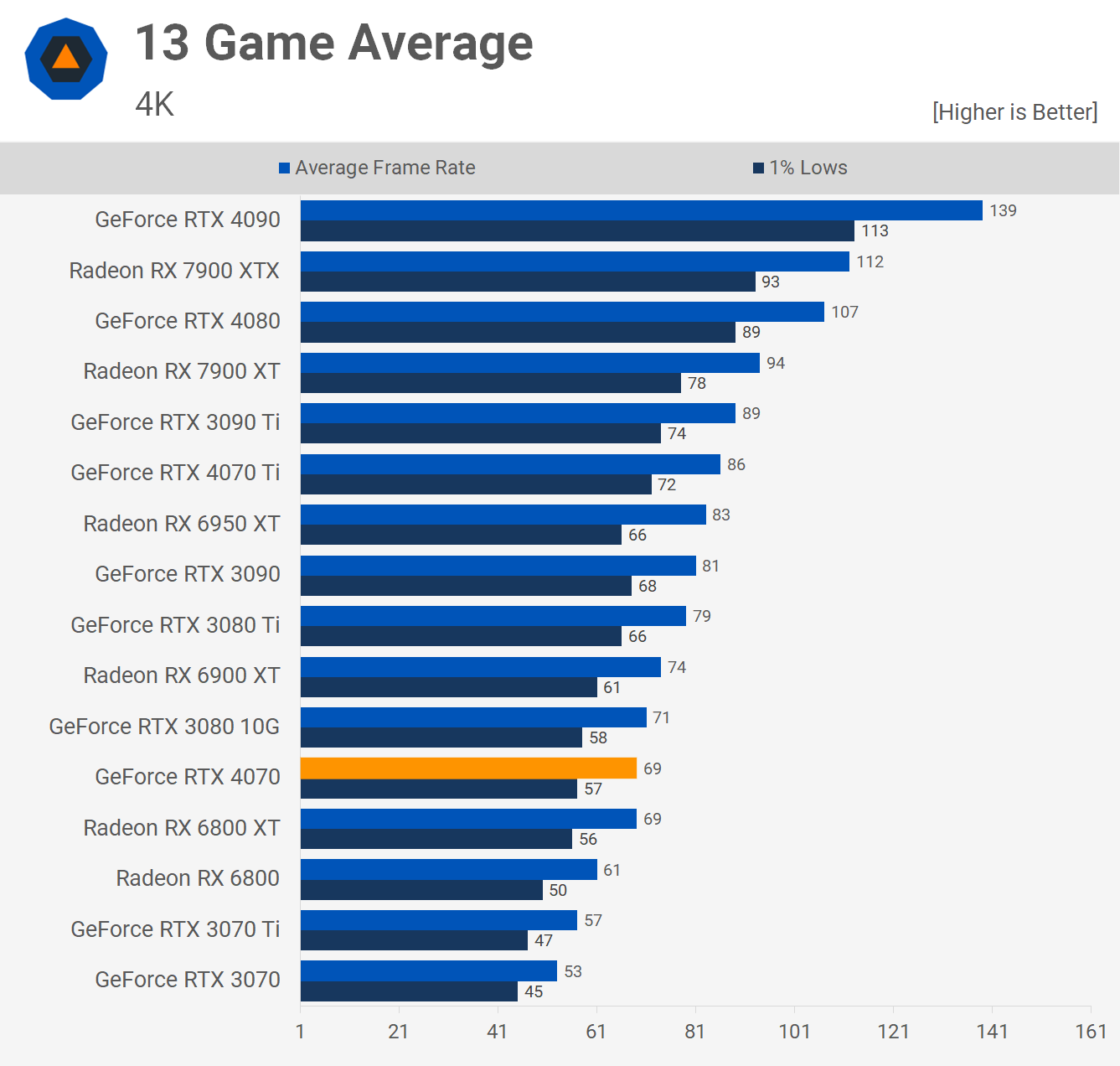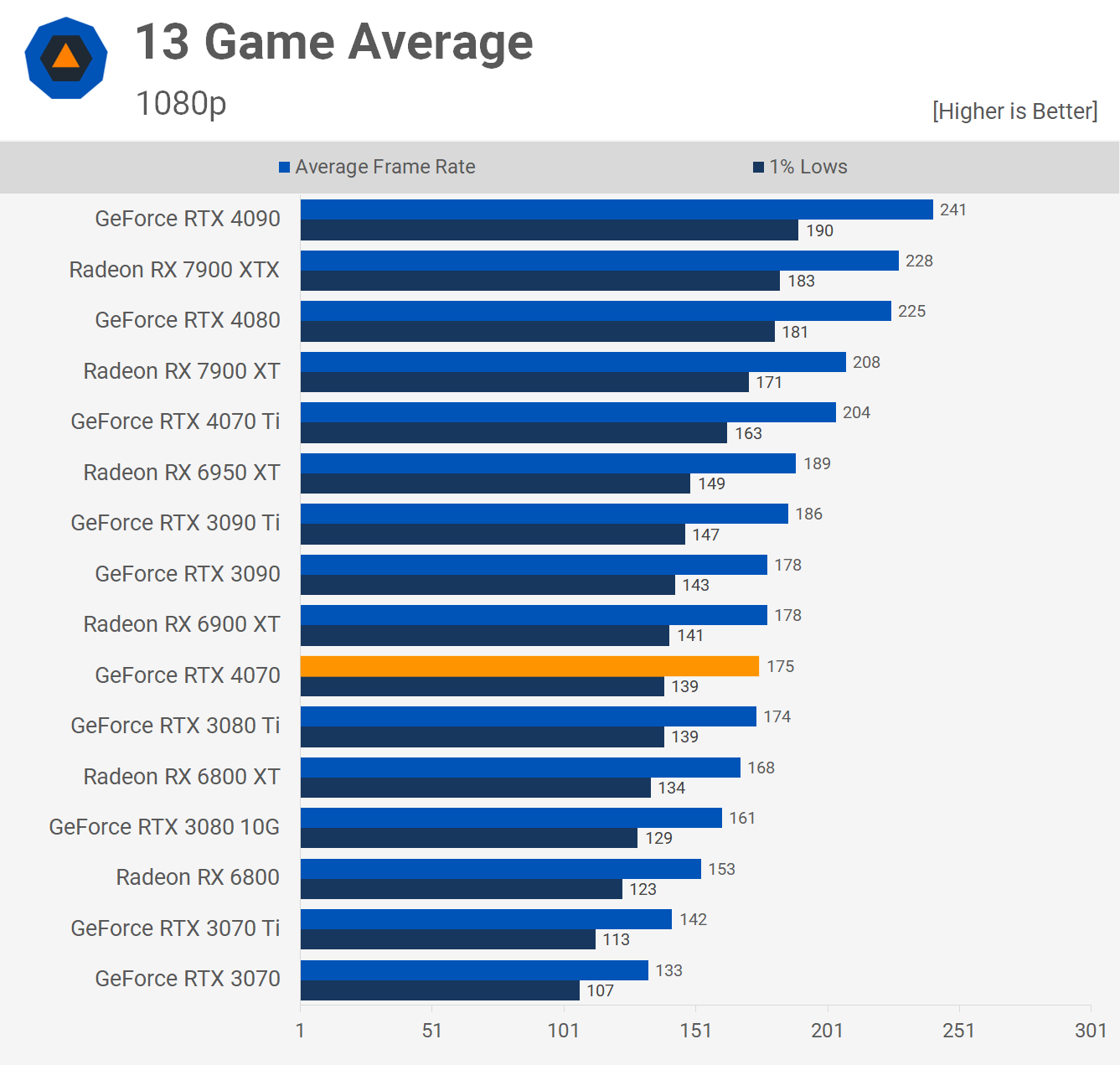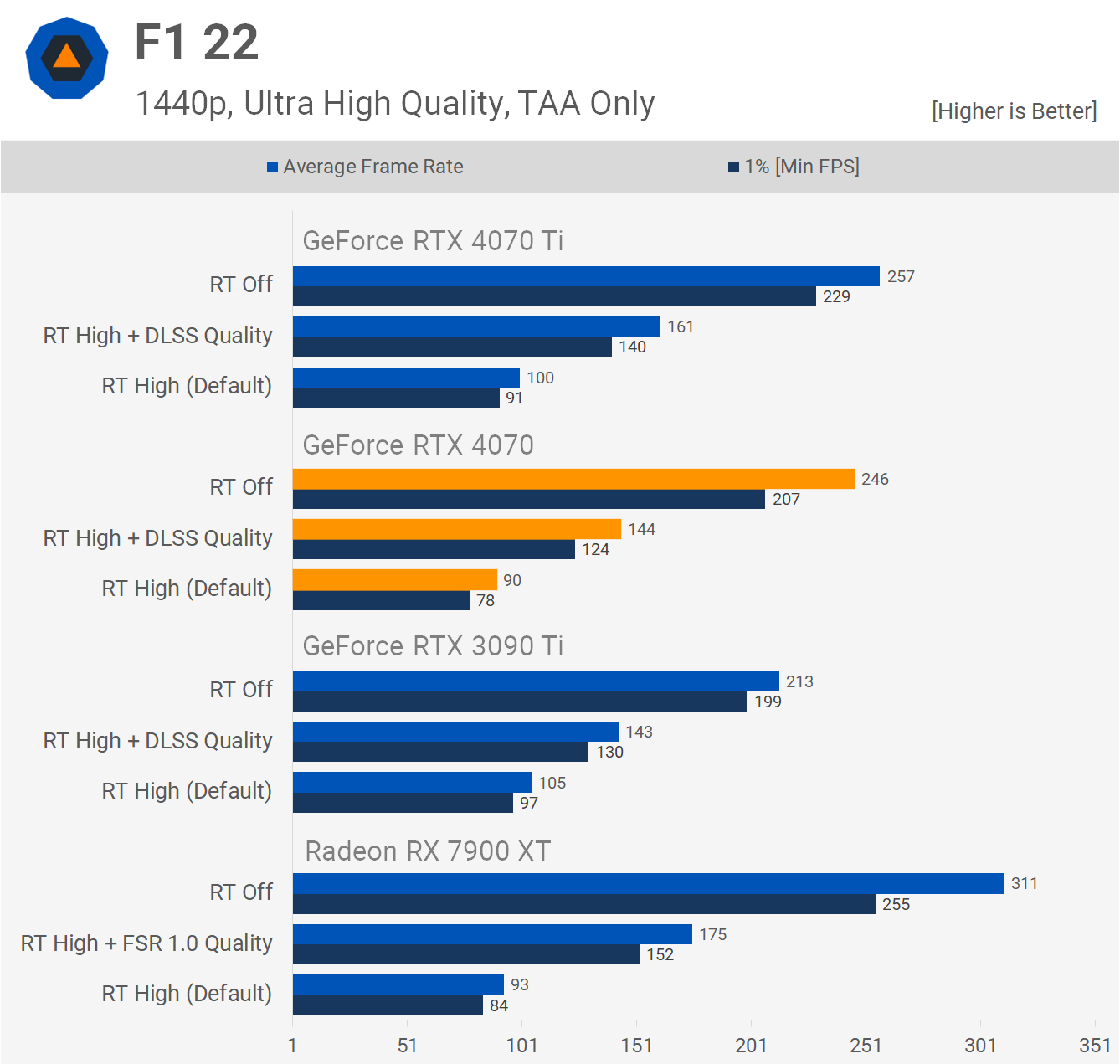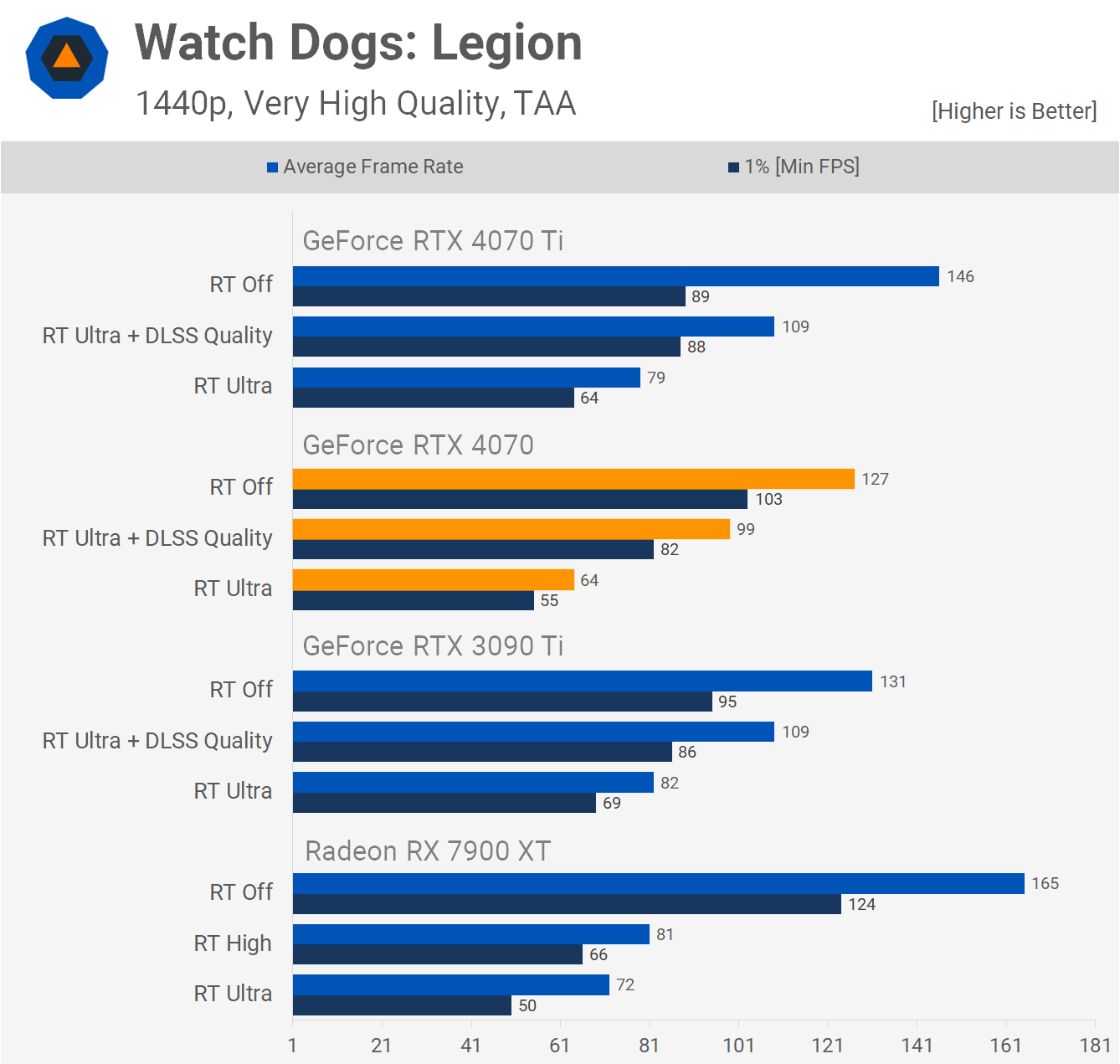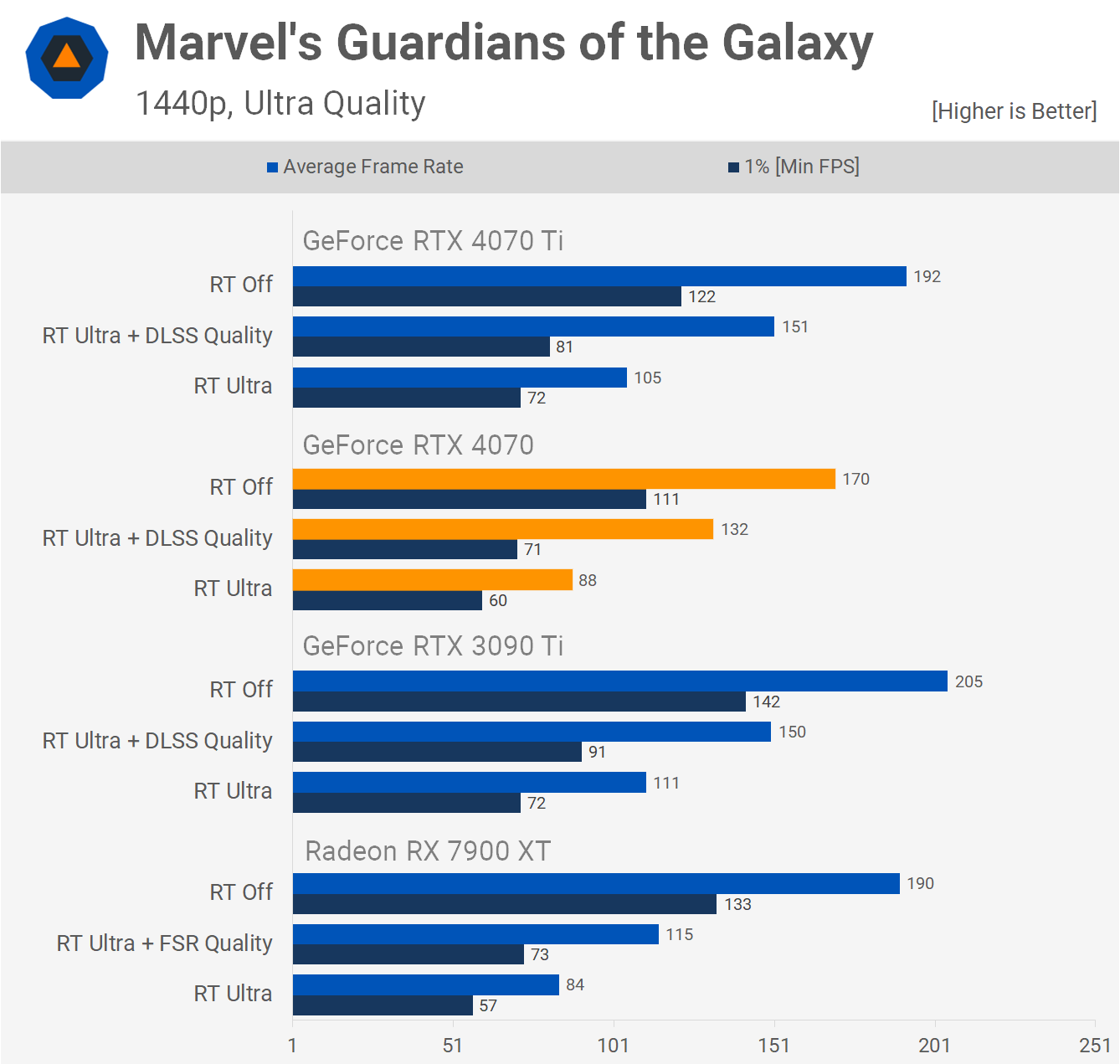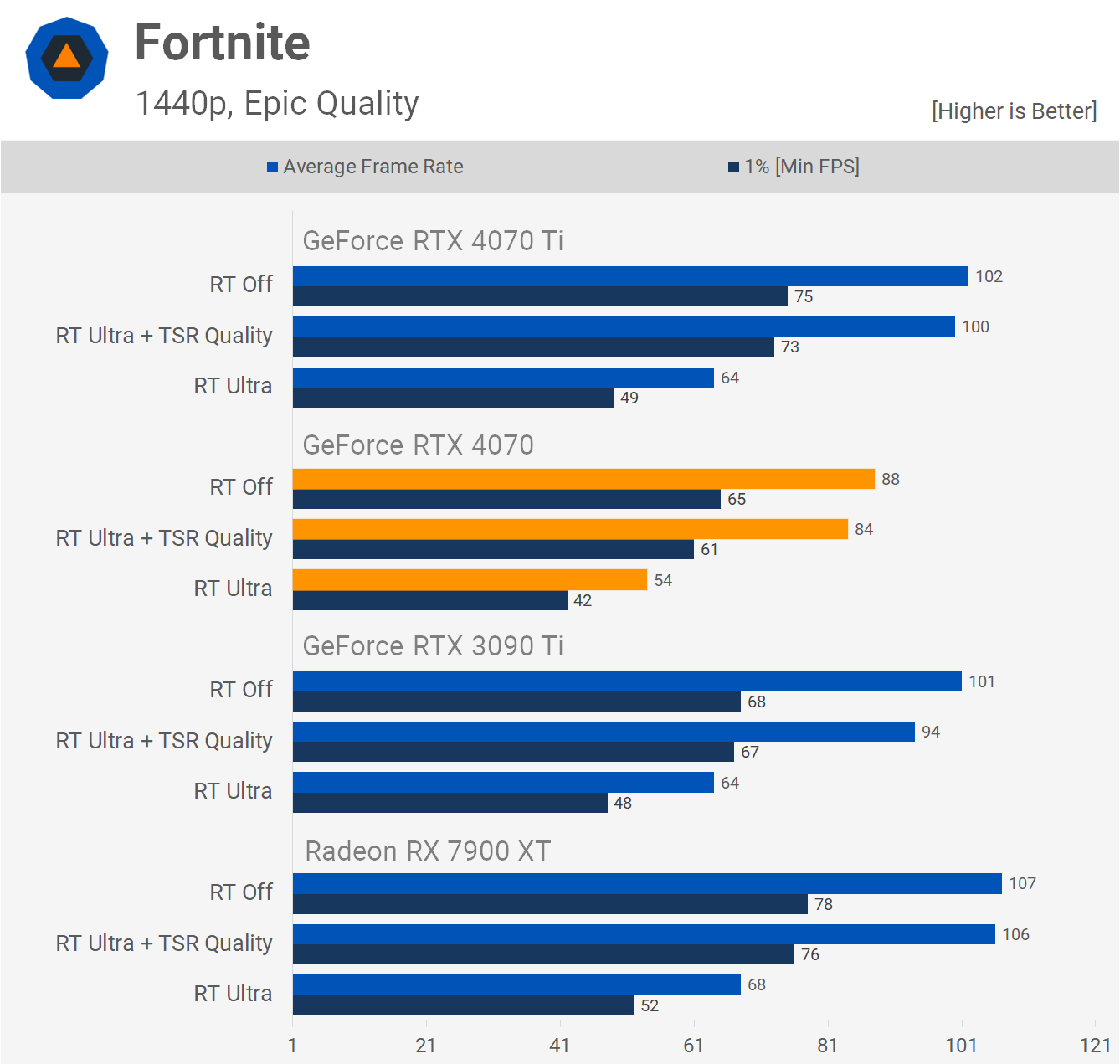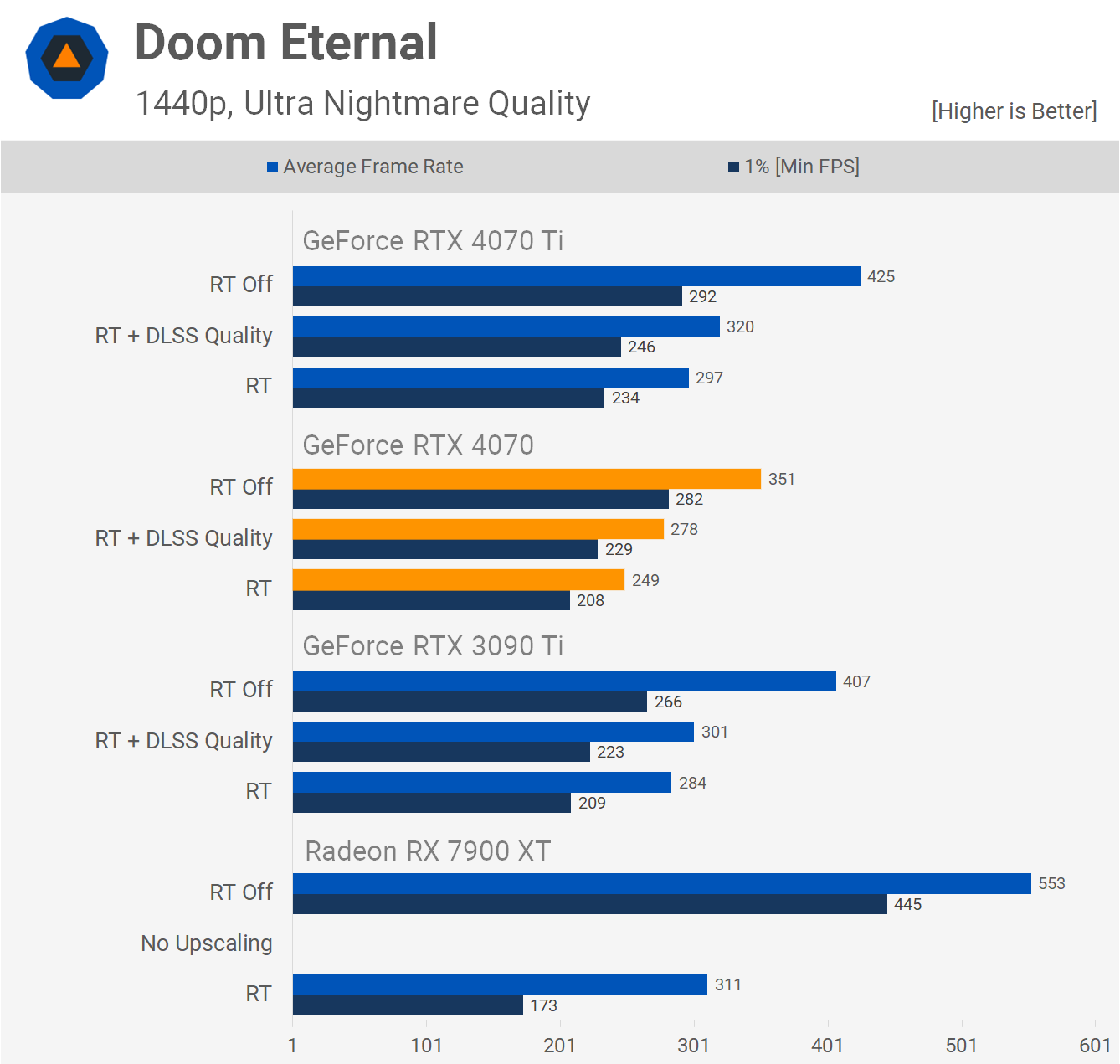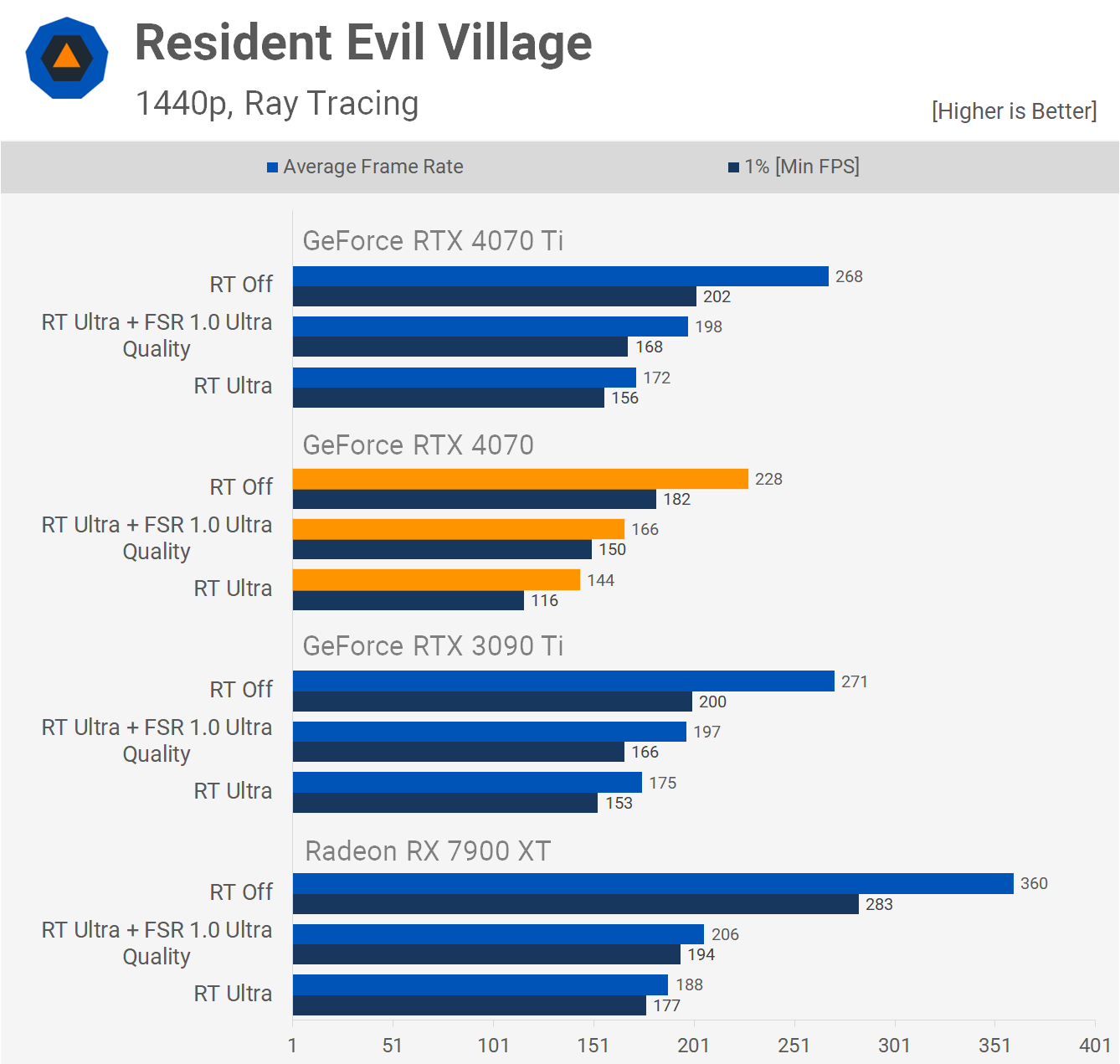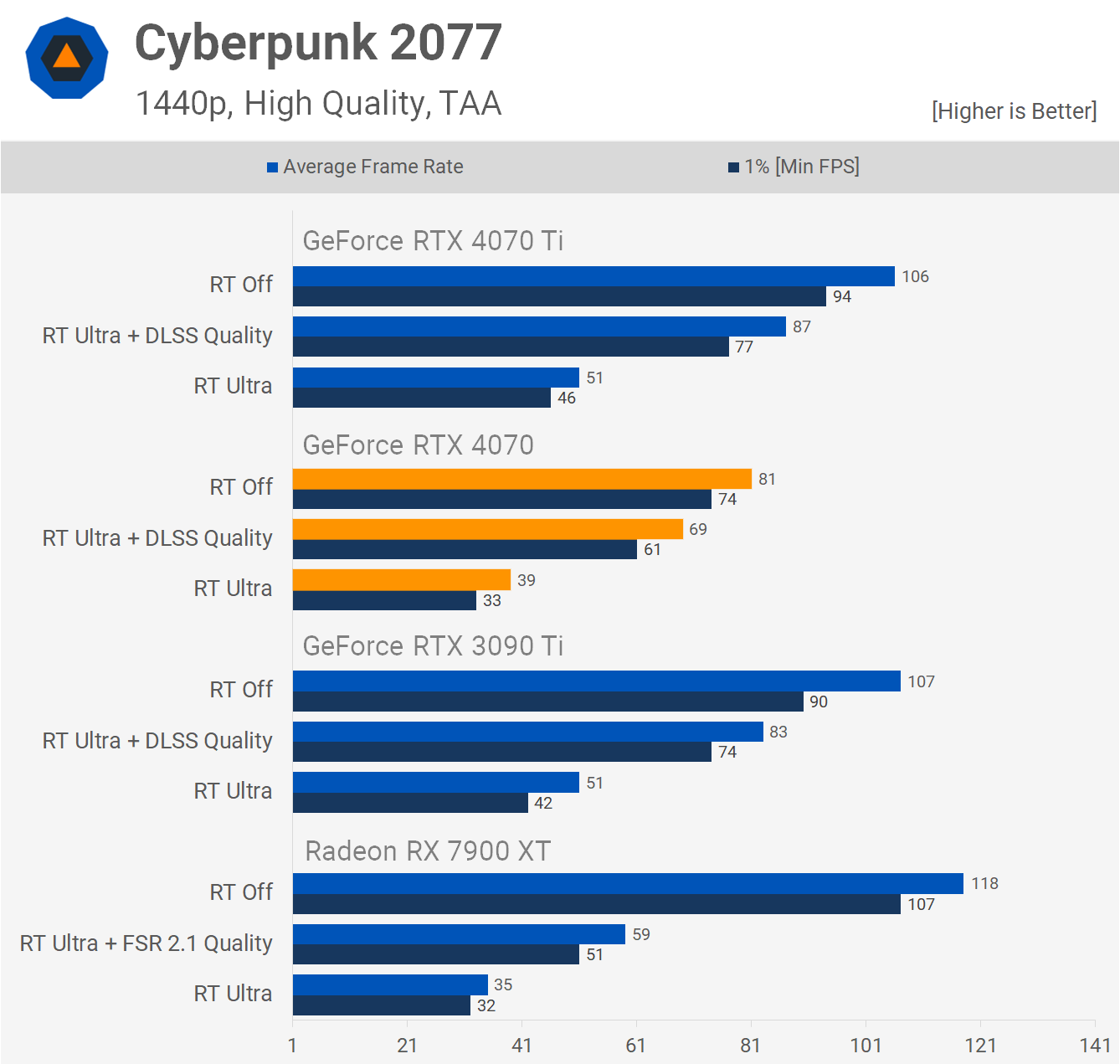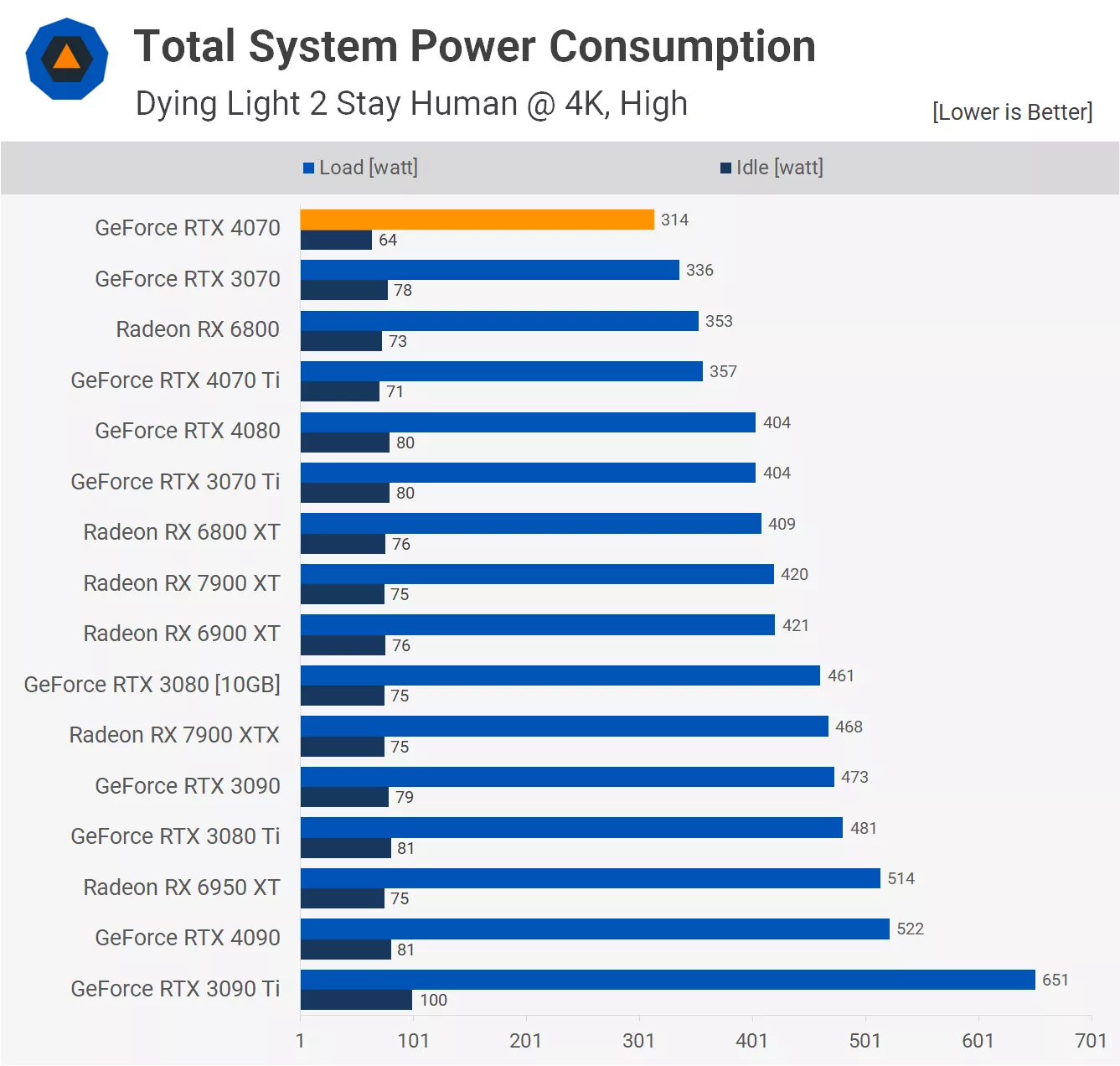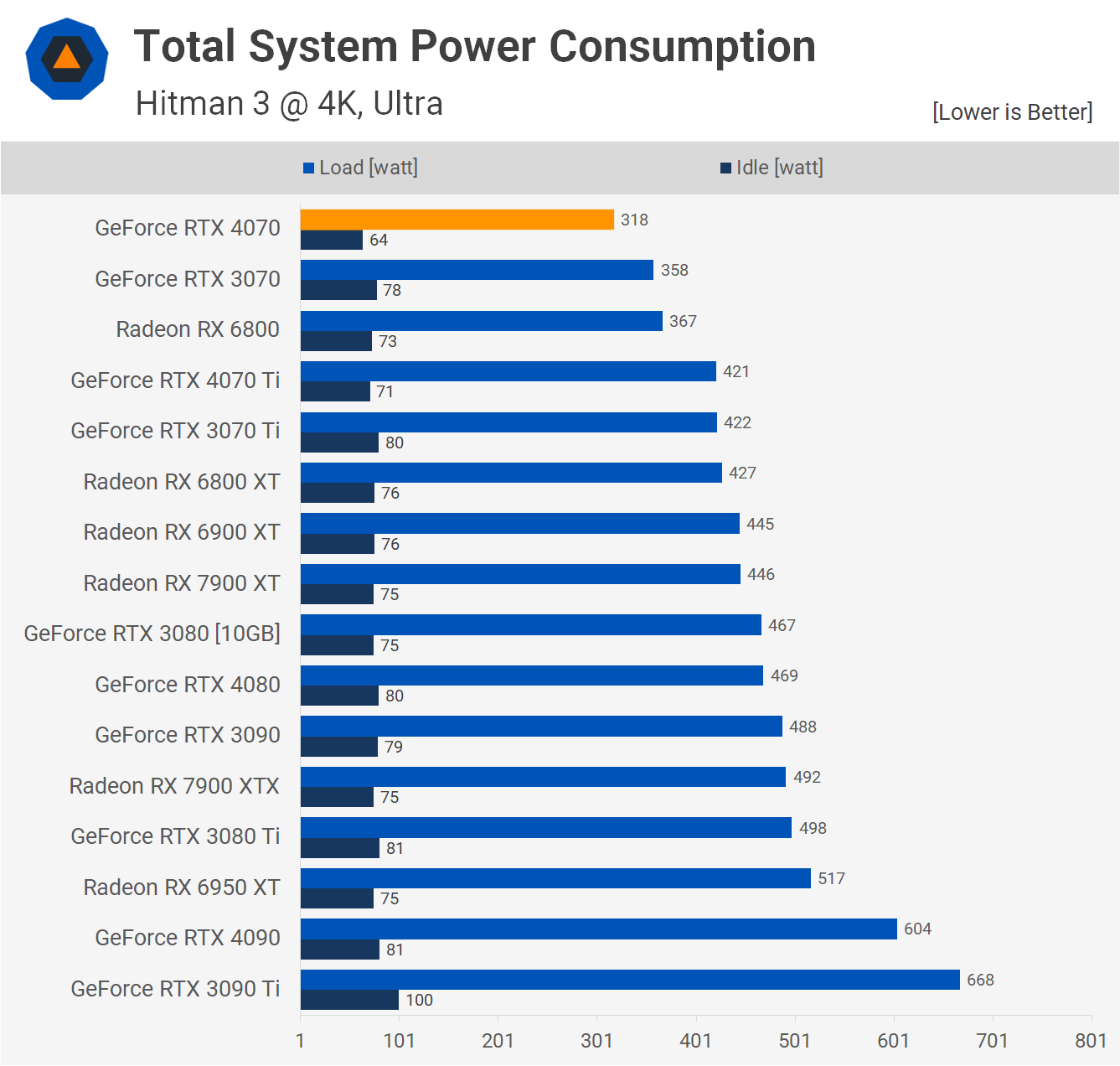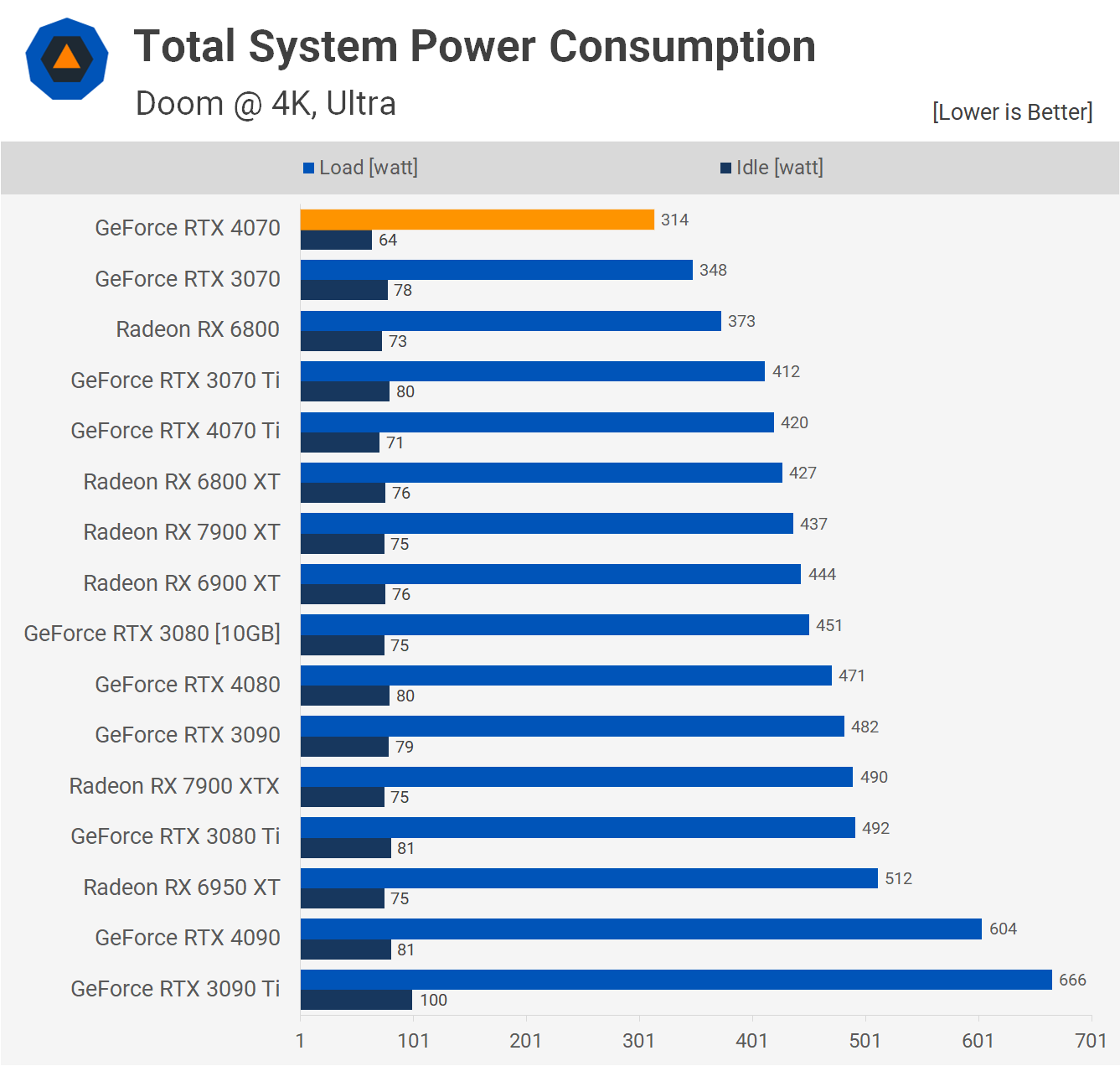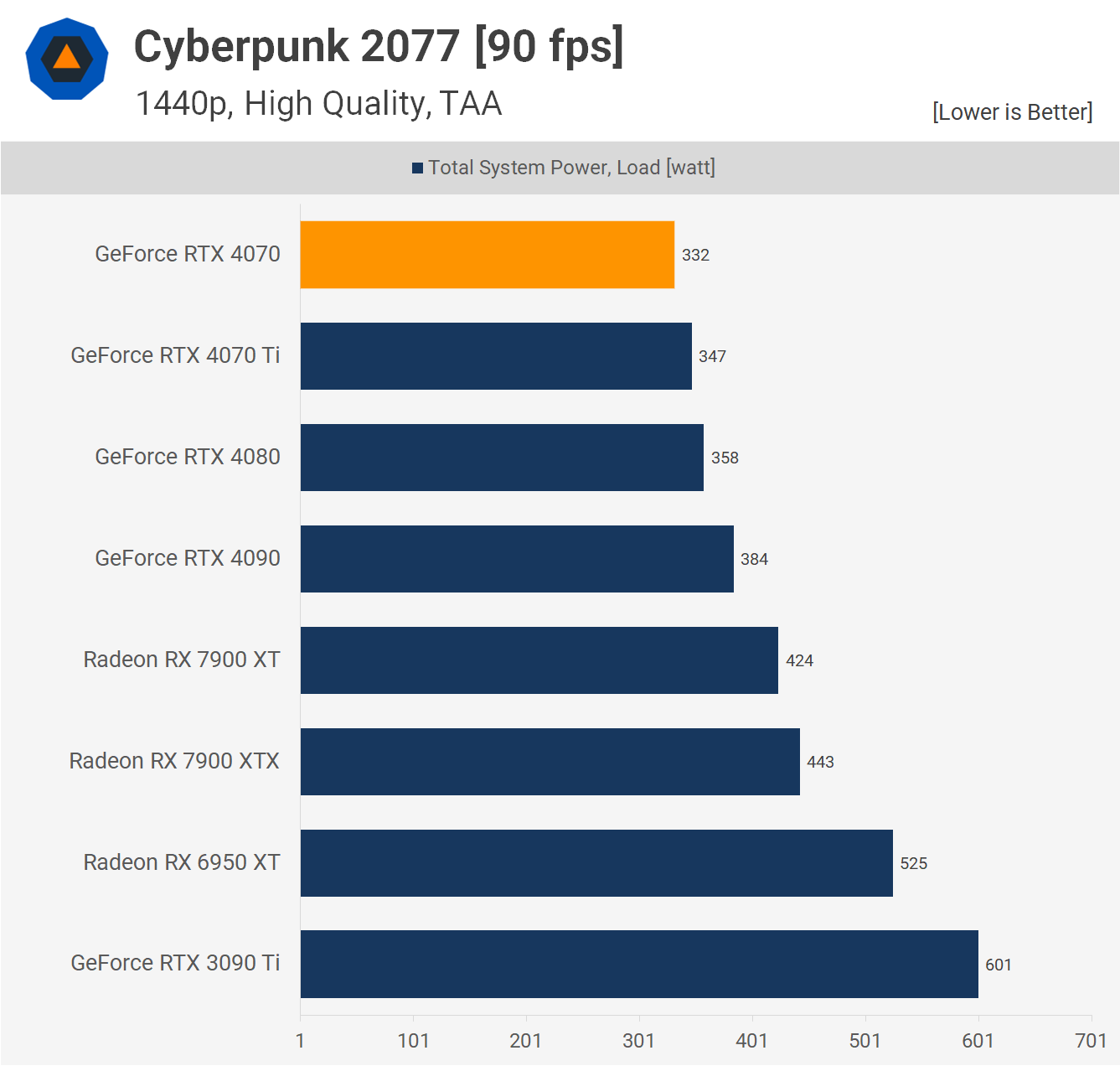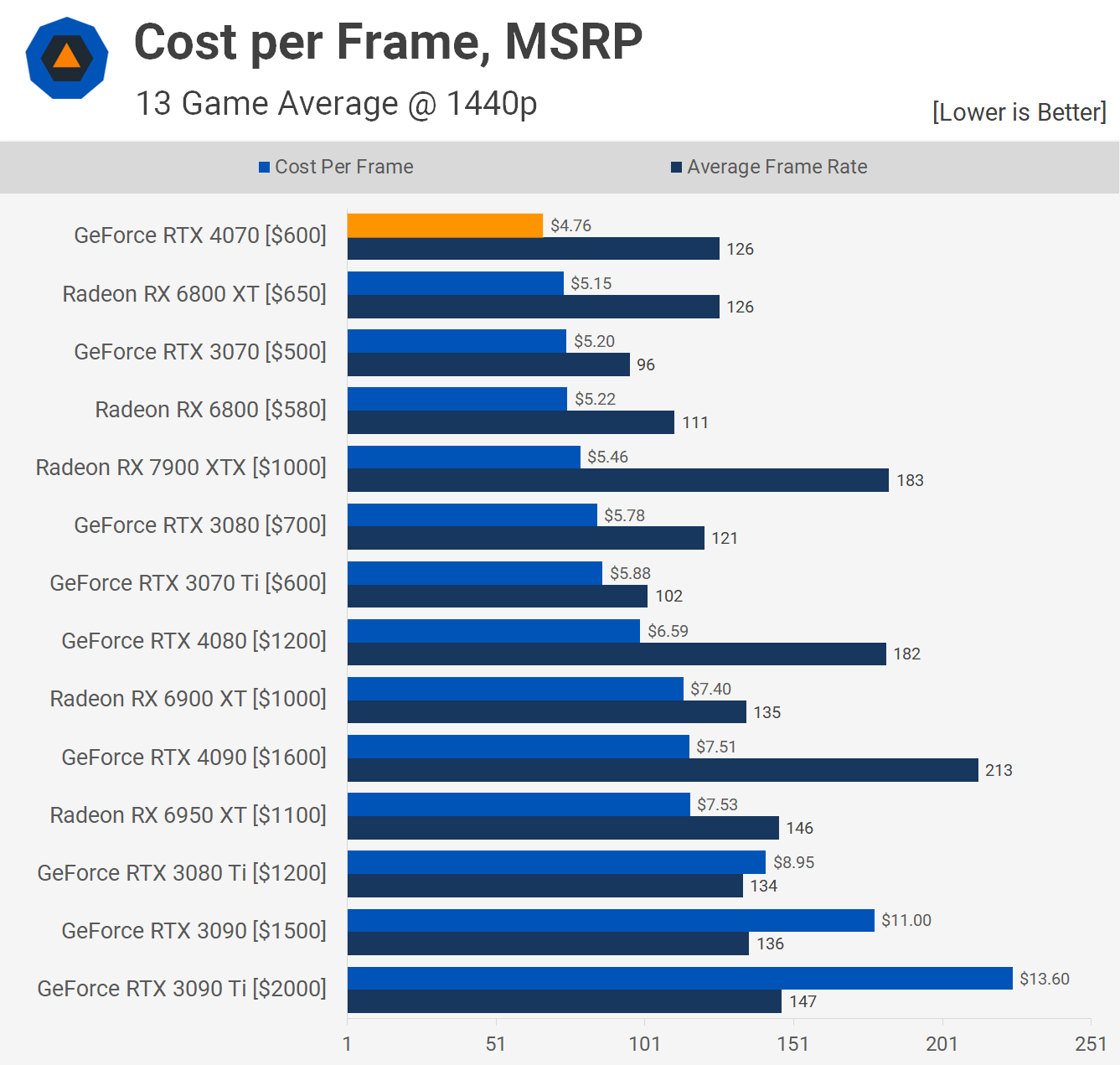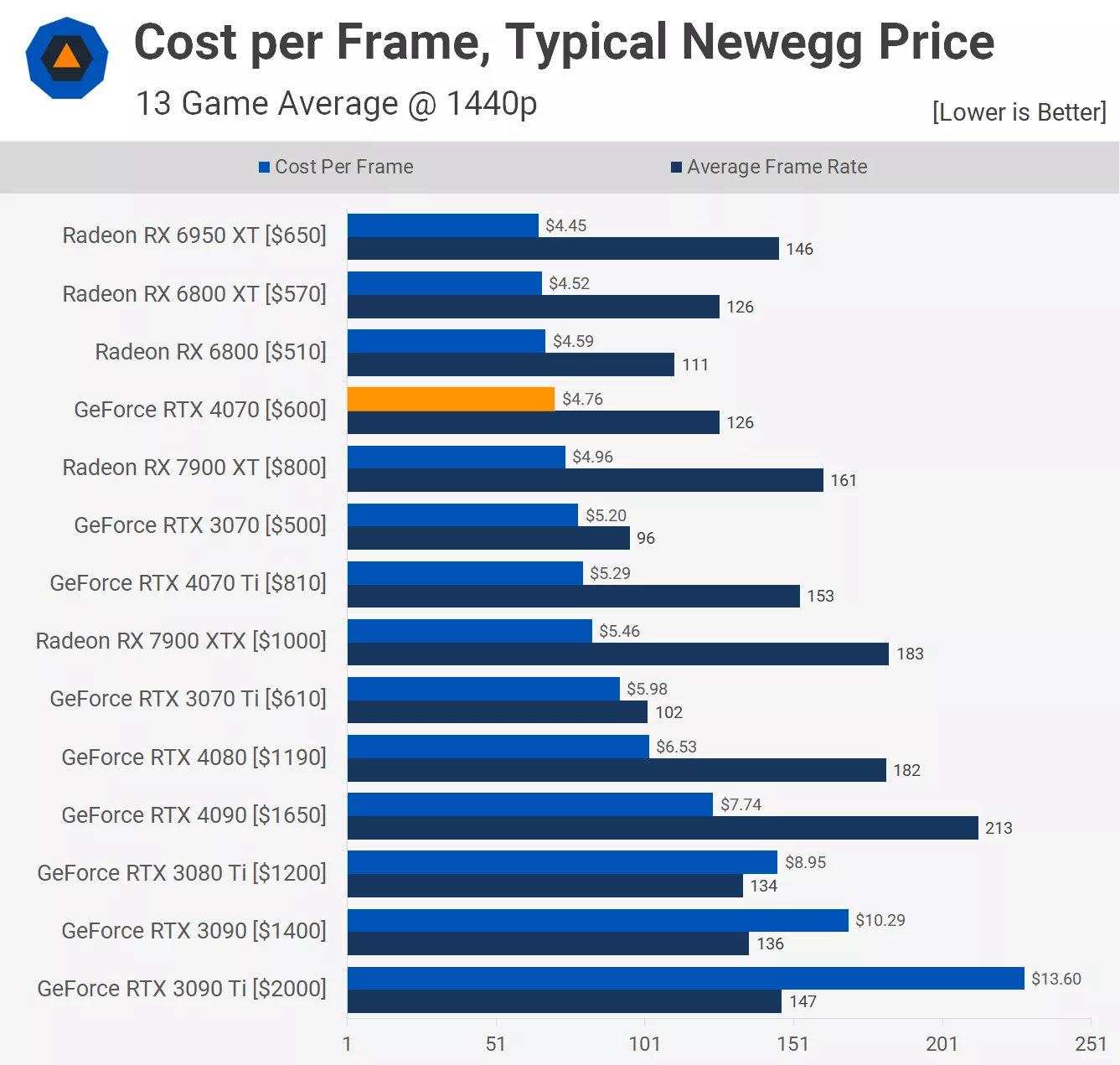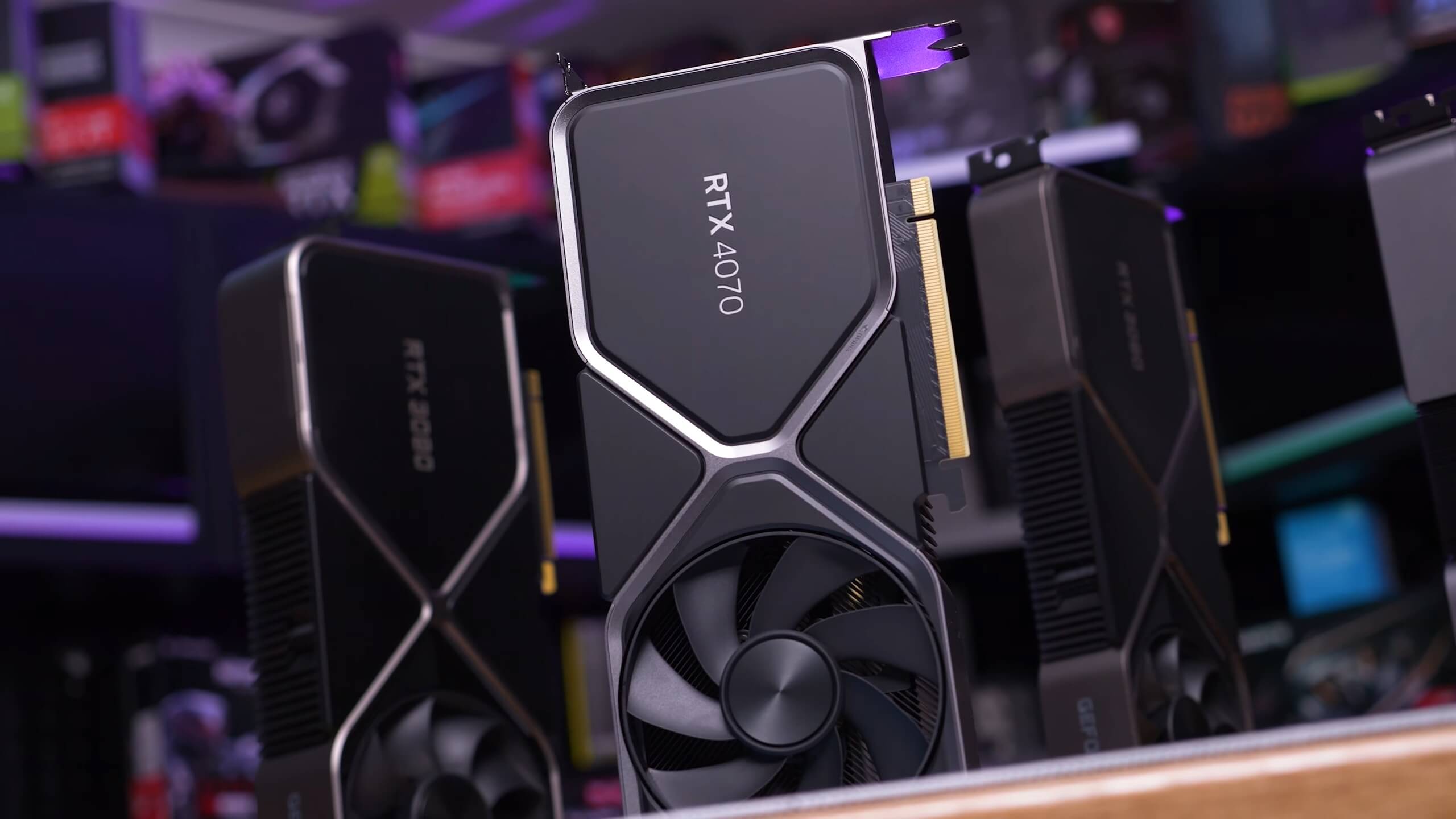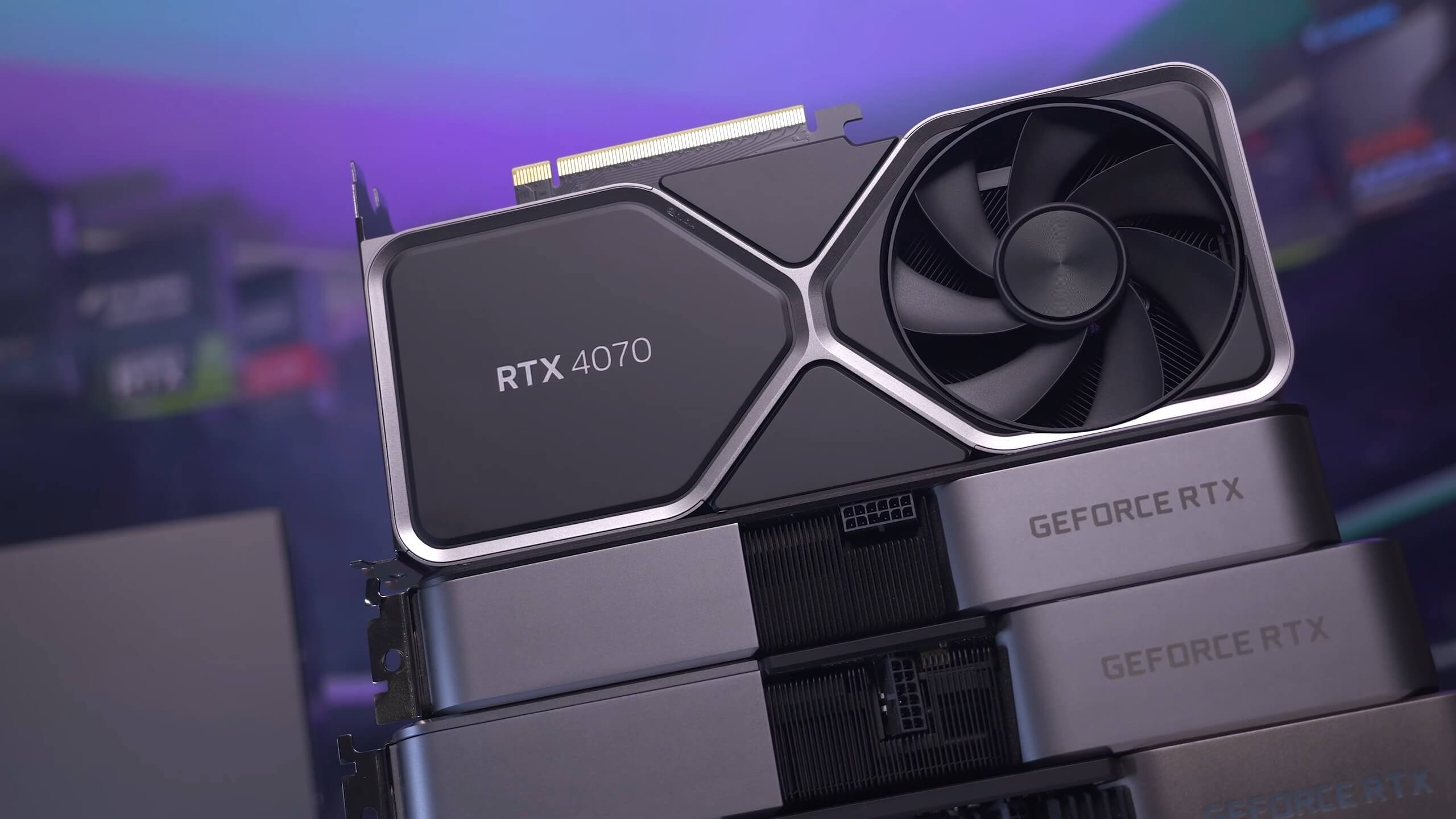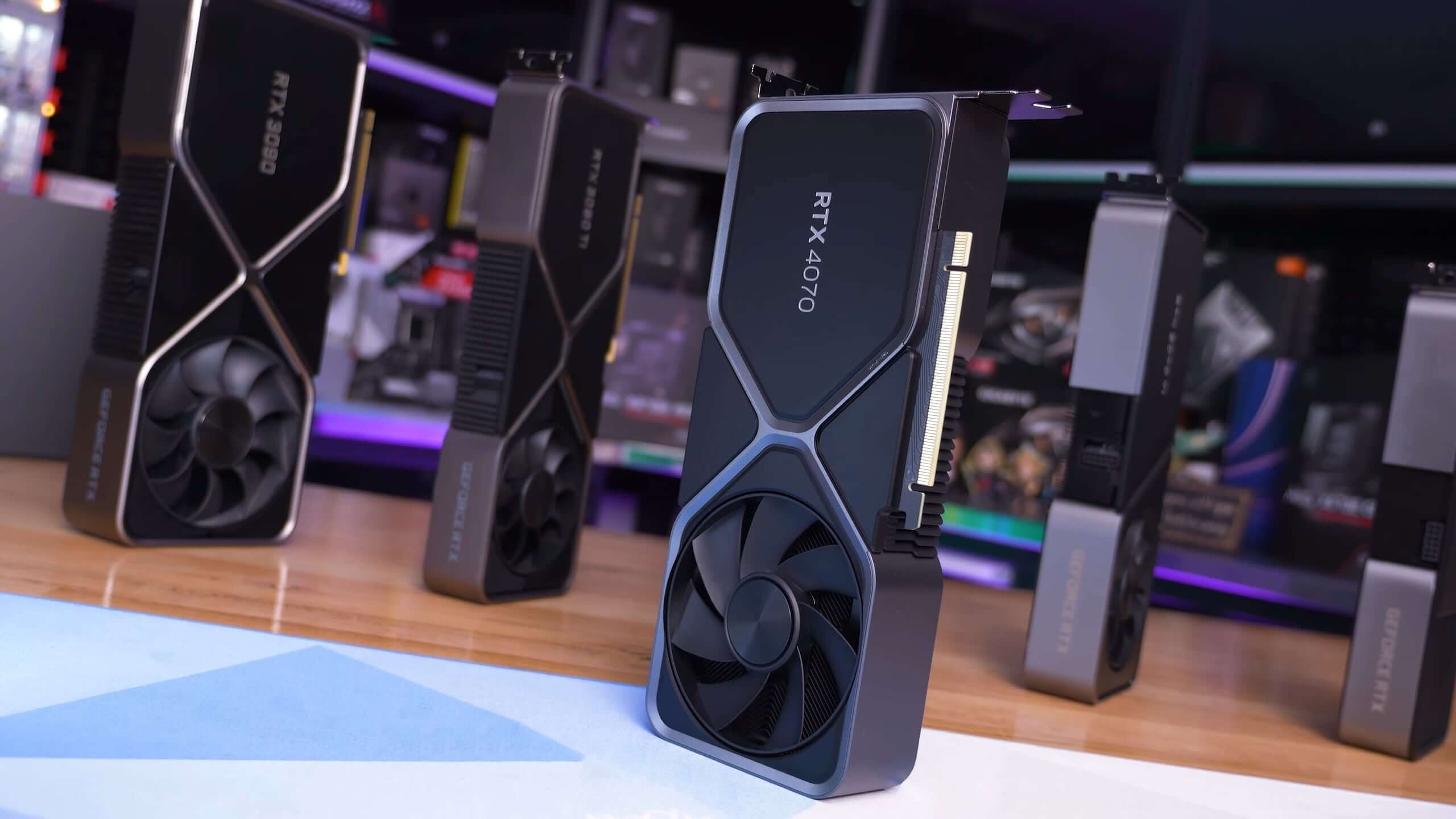Nvidia's GeForce RTX 4070 release has been highly anticipated for its potential of bringing the newer generation to a new low price point and we're happy to report that in that sense it does deliver. The RTX 4070 is set to cost $600, which is a substantial 25% discount when compared to the Ti version. Having said that, looking at the specs we do expect it to be ~20% slower. The same 12GB VRAM as the 4070 Ti are there though, so the RTX 4070 is looking pretty good and we're very excited to check it out.
Like the RTX 4070 Ti, the new vanilla non-Ti 4070 is based on the AD104 silicon, though it's been cut down version to 5888 CUDA cores, or 23% fewer than the Ti, there's also 23% fewer texture units and 20% fewer ROP units. The base clock has been set at 1920 MHz, which is 17% lower, while the boost clock has only been reduced by 5%.
On the memory front, Nvidia is still using 21 Gbps GDDR6X on a 192-bit wide bus for a bandwidth of 504 GB/s. As noted earlier, you're still getting 12GB of VRAM, which we now believe to be the minimum amount of VRAM that should be provided on a graphics card not targeting entry-level performance.
Nvidia is producing a Founders Edition of the RTX 4070 which isn't something they did for the 4070 Ti. With a total graphics power rating of just 200 watts, Nvidia's been able to create a dual-slot card - after having become so accustomed to massive 4090, 4080 and 4070 Ti graphics cards, the RTX 4070 seems small, but in reality it's fairly typical when compared to previous generation models, roughly matching the size and weight of the RTX 3070 FE model.
Nvidia's RTX 4070 Founders Edition uses a single 12VHPWR connector, with a dual 8-pin adapter included in the box. However, Nvidia's board partners are free to use the more standard 8-pin connector and are only required to use a single 8-pin connector. On hand for this review we have the MSI Ventus 3x model, which uses a single 8-pin power input. It's a long, triple-fan card and it only requires two expansion slots, so that's nice, and we'll look at thermals and power figures soon.
| GeForce RTX 4090 Ti | GeForce RTX 4080 | GeForce RTX 4070 Ti | GeForce RTX 4070 | |
| Price MSRP | $1,600 | $1,200 | $800 | $600 |
| Release Date | 12-Oct-22 | 16-Nov-22 | 5-Jan-23 | 13-Apr-23 |
| Codename | AD102 | AD103 | AD104 | |
| Process | TSMC N4 5nm | |||
| Core Config | 16384 / 512 / 176 | 9728 / 304 / 112 | 7680 / 240 / 80 | 5888 / 184 / 64 |
| GPU Boost Clock | 2520 MHz | 2505 MHz | 2610 MHz | 2475 MHz |
| Memory Capacity / Type | 24 GB / GDDR6X | 16 GB / GDDR6X | 12 GB / GDDR6X | |
| Memory Speed | 21 Gbps | 22.4 Gbps | 21 Gbps | |
| Bus Type / Bandwidth | 384-bit / 1.1 TB/s | 256-bit / 717 GB/s | 192-bit / 504 GB/s | |
| Total Board Power | 450w | 320w | 285w | 200w |
Something a bit different about this release is that there are two separate embargos. One for non-overclocked models like Nvidia's FE card and MSI's Ventus 3x, and a second embargo which will be lifted 24 hours later covering the overclocked partner models.
Nvidia appears to be prioritizing reviews of models that are meant to sell at or very near the $600 MSRP, while the more premium OC cards can only be reviewed once on sale the following day. Part of the strategy there seems to make it clear that the RTX 4070 is a $600 product, but how true that ultimately ends up being is of course yet to be seen.
The RTX 4070 Ti isn't quite at $800 but most entry-level models are close enough at $810 to $820 as of writing, while overclocked models (Suprim X, Strix, Aorus, for example) are all up around $950 which is an absurd price for a graphics card with 12GB of VRAM.
Our test system is powered by the Ryzen 7 5800X3D with 32GB of DDR5-3200 dual rank memory, which we don't foresee becoming an issue for 1440p benchmarks and isn't a problem at all for 4K testing either. But in the coming week we do plan to start refreshing all our GPU data with many new gaming titles on our 7800X3D test system. The graphics card we're testing is the MSI RTX 4070 Ventus 3x, but please note that performance should be exactly the same as the Founders Edition model.
Benchmarks
First up we have Watch Dogs: Legion, where at 1440p the RTX 4070 was good for 127 fps on average, making it a fraction slower than the RTX 3090 Ti, which means it's also slower than the Radeon 6800 XT.
Performance in this game is just 13% slower than the 4070 Ti, and also 23% behind the Radeon 7900 XT. So in short, we're roughly looking at previous-gen high-end performance for $600, and about what you would have paid for the 6800 XT.
Jumping up to 4K doesn't change much. The RTX 4070 was good for 72 fps which is very much Radeon 6800 XT-like performance, making it 19% slower than the Ti model.
When compared to previous-gen GeForce GPUs, it was 3% faster than the RTX 3080 and 26% faster than the 3070 Ti.
Next up we have Rainbow Six Extraction and here the RTX 4070 is good for 191fps, which is very much RTX 3080 levels of performance, making it 26% faster than the 3070 Ti.
It's also 10% faster than the Radeon 6800 XT, but 7% slower than the similarly priced 6950 XT, based on current retail pricing. We're also looking at an 18% performance deficit to the 4070 Ti and 20% to the 7900 XT.
The GeForce RTX 4070 is still very capable at 4K, rendering just shy of 100 fps, which means Radeon 6950 XT and RTX 3080-like performance in this game - not bad for $600.
The margins remain much the same to the Ti version, this time trailing by 19%.
The Far Cry 6 results are CPU limited at 1440p which is less of an issue for the RTX 4070, and more of an issue for the faster GPUs. For example, it was just 6% slower than the 4070 Ti, though it was still 17% slower than the 7900 XT.
Moving to 4K solves the bottleneck and now the RTX 4070 is 14% slower than the 4070 Ti and 31% slower than the 7900 XT. In this game we're looking at RTX 3080 levels of performance.
Moving on to Assassin's Creed Valhalla at 1440p we see that the RTX 4070 is 16% slower than the Ti model and 27% behind the Radeon 7900 XT.
However, we are looking at RTX 3080 Ti, 3090 and 6900 XT-like performance, so we think for $600 that's a positive result, despite being a more mild 19% boost over the 3070 Ti.
Then at 4K we're looking at much the same, here the RTX 4070 is 15% slower than the 4070 Ti, though when compared to the previous generation, it was delivering Radeon 6800 XT and RTX 3080 performance.
Next we have the Hunt: Showdown results and no surprises here, the RTX 4070 is delivering 6800 XT performance, so slightly slower than the RTX 3080 in this example and just 14% faster than the RTX 3070 Ti.
The results at 4K are even less favourable, here the 4070 was just 6% faster than the 3070 Ti, making it 8% slower than the 6800 XT and 21% slower than the 4070 Ti.
The Outer Worlds saw the 4070 pumping out 141 fps at 1440p which positioned it between the 6800 XT and 3080 in our graph, so a fairly typical result there. It was also just 14% slower than the 7900 XT and 16% slower than the 4070 Ti, which is a good result when compared to those more expensive models.
We find much the same at the 4K resolution, here the 4070 is now 17% slower than the
4070 Ti and 16% slower than the 7900 XT, while 76 fps on average meant we were looking at 6900 XT-like performance.
The RTX 4070 ripped through the Modern Warfare II benchmark with 182 fps making it just 11% slower than the 4070 Ti, though it was 32% slower than the 7900 XT. Still when compared to previous gen products the new 4070 was comparable to the 6800 XT, which meant it was actually faster than the 3090 Ti.
Then at 4K we're again looking at 6800 XT performance, though this time that did make it slightly slower than the 3090 Ti, which is obviously still a great result.
The RTX 4070 looks well down on our Hitman 3 graph at 1440p, but with 147 fps on average it was 4% faster than the RTX 3080 and just 3% slower than the 6800 XT. That said it was around 20% slower than the 4070 Ti and 7900 XT.
Jumping up to 4K did advantage the higher core count models as here the 4070 was 30% slower than the 4070 Ti and 38% slower than the 7900 XT, which admittedly is a very large margin. Still when compared to previous generation parts we are looking at RTX 3080 levels of performance.
Next we have the F1 22 results and by default this game enables ray tracing with the ultra high preset, so we've left RT effects enabled. Here the 4070 was good for 90 fps at 1440p, making it 10% faster than the RTX 3080 and just 3% slower than the 7900 XT. Moreover it was just 10% slower than the 4070 Ti, so a really good result here for Nvidia's new $600 offering.
Then at 4K we're looking at RTX 3080 Ti and 3090 performance, making the 4070 only slightly slower than the 7900 XT in this example. Then we see that it's 13% slower than the 4070 Ti, so again a good result for the 4070 here.
The 4070 doesn't look amazing in our Cyberpunk 2077 benchmark, here it rendered just 80 fps on average making it 25% slower than the 4070 Ti and a massive 32% slower than the 7900 XT. When compared to previous generation products we're only looking at RX 6800 levels of performance, though that still meant it was 14% faster than the 4070.
Performance margins are much the same at 4K, here the 4070 was 24% slower than the Ti model and 37% slower than the 7900 XT. Meanwhile we're again looking at RX 6800 levels of performance, making it slightly faster than the 3070 Ti.
The 4070 was also rather unimpressive in Dying Light 2, at least relative to parts like the 7900 XT which were 35% faster, or even the Ti model which was 29% faster. That said it was 20% faster than the 3070 Ti with RTX 3080-like performance.
Meanwhile the 4K data is even less impressive, here the 4070 was just 15% faster than the 3070 Ti, making it 8% slower than the 3080 and RX 6800.
The Halo Infinite results look much better, at 1440p the 4070 finds itself situated between the 3090 and 3090 Ti, making it 15% faster than the 6800 XT and 17% faster than the 3080. It was also just 4% slower than the 7900 XT, though it was still 18% slower than the Ti version.
Then at 4K we're looking at 68 fps on average, which is still 3080 Ti/3090 levels of performance, and only slightly slower than the 6950 XT, so a good result overall.
Last up we have Shadow of the Tomb Raider and we're not using the built-in benchmark here, rather we're measuring in-game performance using the demanding village section. Here the 4070 rendered 139 fps which is 6900 XT and RTX 3090-like performance, making it 17% slower than the 4070 Ti.
Increasing the resolution to 4K reduces the average frame rate to 74 fps, but we're still looking at 3080 and 6800 XT levels of performance, making the RTX 4070 18% slower than the Ti model.
13 Game Average
The GeForce RTX 4070 is good for 126 fps in our 13 game average at 1440p, which is the same result we received from the Radeon 6800 XT. This means the RTX 4070 is on average 4% faster than the RTX 3080 and 24% faster than the 3070 Ti.
Impressively, it's sitting just 7% behind Nvidia's previous generation flagship, the GeForce RTX 3090, or 14% slower than the refreshed RTX 3090 Ti which eventually became the 30 series flagship.
Other relevant comparisons include the AMD's older flagship, the 6950 XT which is a tad faster, while scoring an average frame rate just 7% slower than the Radeon 6900 XT. When compared to the RTX 4070 Ti, the 4070 is 18% slower there, and 22% slower than the 7900 XT.
Looking at the 4K resolution average, we still see the GeForce RTX 4070 delivering on average 69 fps, which means it was neck and neck with the Radeon 6800 XT once again. It was 20% slower than the Ti model and 27% slower than the 7900 XT.
For those of you interested, here's a look at the more CPU limited 1080p data using the Ryzen 7 5800X3D. Here the GeForce RTX 4070 is just 14% slower than the Ti model and 16% slower than the 7900 XT.
Ray Tracing + DLSS
Let's now look at ray tracing and DLSS performance at 1440p in a few titles, starting with F1 22. The RTX 4070 is just 10% slower than the Ti model in this racing game when running with ray tracing enabled, and then just 4% slower with RT disabled, though we're likely running into the limits of our 5800X3D CPU here.
It's still interesting to note that with ray tracing enabled, the RTX 4070 is 14% slower than the 3090 Ti, but with DLSS enabled performance was about the same and then with RT disabled the RTX 4070 was 15% faster - some interesting scaling there. We're also looking at similar ray tracing performance to the Radeon 7900 XT, so the RTX 4070 is certainly much better value when it comes to RT performance.
In Watch Dogs: Legion the RTX 4070 is 19% slower than the 4070 Ti when using ray tracing and 13% slower with RT disabled. Then when compared to the RTX 3090 Ti, it's 22% slower using ray tracing but just 3% slower with RT disabled.
When compared to the Radeon 7900 XT we find that the RTX 4070 is 11% slower with RT enabled and a much more substantial 23% slower with it disabled.
Moving on to the Guardians of the Galaxy, we see that the RTX 4070 is 16% slower than the 4070 Ti with ray tracing enabled, 21% slower than the 3090 Ti, but also 5% faster than the 7900 XT. Then with RT disabled it's 11% slower than the 7900 XT and 4070 Ti.
Next we have Fortnite using hardware ray tracing with Lumen and Nanite enabled.
Here the RTX 4070 was 16% slower than the 4070 Ti and 3090 Ti, and 21% slower than the 7900 XT. So far we're seeing strong RT performance from RDNA 3 using the Unreal Engine 5, though it's unclear if this will be the case for all games using it.
The GeForce RTX 4070 performed very well in Doom Eternal using the ultra nightmare preset. We're looking at 249 fps on average with ray tracing enabled, making it 16% slower than the 4070 Ti and 12% slower than the 3090 Ti.
That said, it was 20% slower than the 7900 XT, the Radeon GPU appears to perform very well in this game, and that's especially true with RT disabled where it was almost 60% faster than the 4070.
Resident Evil Village also plays well on the Radeon 7900 XT, but even so the more affordable RTX 4070 was still very impressive, pumping out 144 fps using the ray tracing preset at 1440p, making it 16% slower than the 4070 Ti and 18% slower than the 3090 Ti.
The Spider-Man Remastered results are unfortunately quite CPU limited with ray tracing enabled, though probably less so in the case of the RTX 4070 as it was 12% slower than the 4070 Ti and 17% slower than the 7900 XT. Still, 116 fps on average is impressive and DLSS was able to bump that up to 128 fps.
Cyberpunk 2077 is an extremely demanding game, even without ray tracing, so unsurprisingly the RTX 4070 is limited to just 39 fps here, though DLSS quality mode drastically improved performance getting us to 69 fps.
In this example, the RTX 4070 is 24% slower than the 4070 Ti and 3090 Ti, but beat the 7900 XT by an 11% margin. Of course, the 7900 XT was faster with RT disabled, but if you care about ray tracing the RTX 4070 represents really great value at $600.
Power Consumption
The GeForce RTX 4070 is particularly impressive in the power efficiency department. We're measuring total system usage here and as you can see the RTX 4070 allowed for a total system consumption of 318 watts, which is 11% less than the RTX 3070 - super impressive given it offered roughly 40% more performance in this test.
We find similar figures in other games, Doom saw total system usage hit 314 watts which is a 10% reduction when compared to the RTX 3070 and a 26% reduction compared to the 6800 XT, which delivered a similar level of performance.
Dying Light 2 saw more of the same, 314 watts total system usage which was a good improvement over previous generation models.
By locking the frame rate at 90 fps, we can see just how efficient the RTX 4070 really is.
Total system usage dropped by 4% when compared to the 4070 Ti and a massive 22% when compared to the Radeon 7900 XT, that is a remarkable power saving at the same level of performance, so excellent work here by Nvidia.
Cost Per Frame
It's now time for the all-important cost per frame analysis and we'll start with the MSRP figures. Based on our 1440p data, the $600 MSRP makes the RTX 4070 the best value GPU released at this performance tier for this generation and last, though to be fair AMD has yet to release a $600 RDNA 3 competitor - still, when compared to Radeon RX 6000 and GeForce 30 series offerings, the RTX 4070 looks good, at least based on MSRP pricing...
If Nvidia can indeed deliver RTX 4070 graphics cards at the $600 MSRP, then it will be a good value product relative to what we've seen from AMD and Nvidia recently. We've often talked about how the Radeon 6800 XT and GeForce RTX 3080 10GB were the last sensible high-end products and the RTX 4070 is delivering similar performance at a more competitive price (at launch).
We're only talking about an 8% improvement over the Radeon 6800 XT after 2 years, but compared to what we have been getting, that's actually a good result. It's also an 18% improvement from the RTX 3080 and a 19% improvement over the terrible value RTX 3070 Ti.
On that note, we feel the RTX 4070 is best compared in terms of value with either the GeForce RTX 3080 10GB or RTX 3070. When compared to the 3070, we're looking at an 8% improvement in cost per frame, or the same margin seen when comparing with the Radeon 6800 XT or plain old 6800.
That's good but not mind-blowing. Basically the RTX 4070 is 20% more expensive than the RTX 3070 and offers on average 31% more performance.
Now if we look at current retail pricing for each product - including the older GPUs that can still be purchased new - we find that the RTX 4070 is less attractive. The Radeon 6950 XT is a particular standout here as it's just $50 more than the RTX 4070 MSRP, but offers 16% more performance on average.
The Radeon 6950 XT also offers 4GB of extra VRAM, though RT performance is weaker and you miss out on features like DLSS and frame generation, which are probably worth paying a premium for, depending on the type of gaming you do.
The Radeon 7900 XT is also appealing at $800. Granted, it's quite a bit more than the RTX 4070, but you're getting loads more VRAM at 20GB and almost 30% more performance, so we'd say the 7900 XT will turn out to be a significantly better investment, but that's merely a guess on our part.
All in all, while there are viable Radeon alternatives, even with a direct RDNA 3 competitor, we'd say the new RTX 4070 remains a compelling option at $600.
Cooling
Taking a quick look at operating temperatures after an hour of load inside a closed ATX case. MSI's Ventus 3x peaked at just 64c with a fan speed of 1400 RPM. This card was whisper quiet and very cool. Impressive results which prove that all you need for optimal operation is a base model MSRP card that's well equipped like this MSI offering.
Then we have Nvidia's FE model which ran slightly hotter, peaking at 67c with a slightly louder 1700 RPM fan speed, but still an exceptionally good result, especially when you consider how compact the FE model is.
What We Learned
Given the current market, the GeForce RTX 4070 happens to be a rather good deal and it's certainly much closer to an acceptable price tag than any other current generation GPU release so far. We're talking Radeon 6800 XT / GeForce RTX 3080 levels of performance for $600 - not exactly mind-blowing stuff after about two and a half years - but it's a $50 to $100 discount when comparing launch MSRP pricing and it's not like the crypto bubble didn't happen.
In an ideal world, the GeForce RTX 4070 would be a $500 product, meaning that $600 is a 20% markup but still much closer to our ideal price than everything that's come before it. That makes it hard for us to criticize the $600 MSRP, because the numbers tell us that the RTX 4070 is now the best value GPU priced above $500 (both current and previous generation), while also including support for the modern technologies such as DLSS 3.
Speaking of DLSS 3, the reason why we included no DLSS 3 benchmarks in this review is the same reason given in our RTX 4080 review and further discussion when we cross-tested FSR and DLSS after some Reddit controversy. But in short, a big issue with DLSS 3 benchmarks is reporting frame generation as an FPS metric, as 120 fps for example using DLSS 3 frame generation really isn't 120 fps: it's the smoothness of 120 fps but with the input of roughly half that frame rate, plus a few graphical issues. This is a serious issue for benchmarking and we would suggest any reviewer benchmarking with frame generation enabled should report the numbers as "120 DLSS 3.0 fps", as an example.
Going back to buying recommendations, the RTX 4070 is a solid offering but there are a few alternatives you may want to consider. The Radeon 6800 XT can be had for around $570 and it offers more VRAM, but you'll have to weigh that up against the lack of DLSS support and inferior ray tracing performance - we'd probably still go with the RTX 4070. The Radeon 6950 XT could make for a stronger case with on average ~15% more performance for $650, but the same pros and cons apply here.
There's also a case to be made for the Radeon RX 7900 XT, which is on the next price tier at $800. In terms of cost per frame they are matched, and the Radeon is on average nearly 30% faster. The big draw card is the extra 8GB of VRAM, 12 GB to 20 GB is a massive upgrade which may hand the 7900 XT a serious visual advantage in the not to distant future, much like what we're seeing when comparing the Radeon 6800 and RTX 3070 in modern games today. But, of course, $200 is still a lot of money, and may only be well justified if you're planning on holding onto your next graphics card for 3 - 4 years.
As mentioned before, we'll quickly note that 12GB is now what we consider to be the bare minimum - that is to say, you shouldn't purchase a graphics card with less than 12 GB VRAM when spending over $200 in a new GPU. It is our opinion that 8GB should be reserved for entry-level gaming products now, and anything less than 8 GB isn't suitable for current generation gaming.
Bottom line, the GeForce RTX 4070 is a good value product packing a strong feature set and excellent performance. We're happy that the RTX 4070 has turned out to be a product that we can recommend, and we expect this GPU to sell very well if they can meet the promised $600 MSRP.
Shopping Shortcuts:
- Nvidia GeForce RTX 4070 on Amazon
- Nvidia GeForce RTX 4070 Ti on Amazon
- Nvidia GeForce RTX 4090 on Amazon
- AMD Radeon RX 7900 XT on Amazon
- AMD Ryzen 7 7800X3D on Amazon
- AMD Ryzen 7 7700X on Amazon
Further Testing
Since we posted this original review of the GeForce RTX 4070, we have written new comparisons and relevant benchmarks you may be interested in:
